First takes on the news of the minute from the L.A. Times Opinion section. Follow us on Twitter @latimesopinionand Facebook.
- ‘Forrest’ Trump promises to strip away California’s FEMA wildfire recovery funds
- For a self-described ‘deal maker,’ Trump appears to have no idea how negotiation works
- If Trump thinks undocumented migrants are dangerous, why has he hired so many of them?
- How Trump’s constant lying might forever damage the presidency
- Share via
PG&E is going into bankruptcy. But what happens after it comes out?

Pacific Gas & Electric was the only California utility to file for bankruptcy protection when the state went through a self-inflicted energy crisis in the early 2000s. Now it is poised to be the first to file for bankruptcy protection as the state goes through a wildfire crisis.
PG&E, which serves an enormous swath of communities from Santa Barbara to Humboldt counties, filed notice Monday that it intends to file a petition to reorganize its debts under the protection of Chapter 11 of the federal bankruptcy code. Under Chapter 11, companies try to work out a deal with creditors that wipes out part of their debt and puts them on a path to long-term survival.
But bankruptcy is essentially a backward-looking process. It’s about the debts you have amassed, which in PG&E’s case include as-yet undetermined (but no doubt enormous) sums associated with last year’s devastating Camp fire.
What about the fires to come?
The increasing amount of development in areas that were once wild is pushing power lines deeper and deeper into areas that are rich in vegetation that turns to kindling during the state’s seemingly endless dry season. This is a problem not just for PG&E, but for all the state’s utilities.
The state’s big utilities have started installing equipment to cut off power when winds threaten to thrust trees into their lines. That will help, but the real solution is to clear the areas around power lines so they cannot be downed by windblown tree limbs, and that’s a gargantuan task.
According to the Wall Street Journal, a report PG&E filed with the state in January 2018 estimated that its lines were threatened by 120 million trees. With the utility trimming trees at a pace of 1.4 million a year, it can’t possibly get its corporate arms around that problem.
The utility might be able to ameliorate the problem by burying power lines. But that’s an expensive process, and PG&E has 125,000 miles of lines.
Property owners can and should be part of the solution, and the state Legislature took steps last year to give them more incentive to clear their land to provide a margin of fire safety. Insurers also are a factor, as the rates they charge in areas with high fire risks can deter development. And so are local governments, which can do significantly more than they are doing now to increase the supply of affordable housing in cities.
But it seems inevitable that utilities will face more lawsuits, because we will certainly have more destructive wildfires. Our changing climate will guarantee that. And going into bankruptcy now won’t reduce the liability exposure for wildfires and the lawsuits they bring in the future.
- Share via
Kamala Harris seems pretty clueless about the Knights of Columbus. That could cost her with Catholics

In 2017 Sen. Dianne Feinstein was criticized — fairly, in my view — for implying that a judicial nominee couldn’t serve fairly as a federal judge because she was a devout Catholic and “the dogma lives loudly within you.” Now Feinstein’s fellow Democrat from California, Sen. Kamala Harris, is also being accused of Catholic-bashing because of questions she posed to another judicial nominee.
Some of the pushback is coming from inside the Democratic House. Without mentioning any names, Rep. Tulsi Gabbard (D-Hawaii) has criticized other Democrats for suggesting that Brian C. Buescher, a nominee for a district judgeship in Nebraska, is disqualified because of his Catholicism and his membership in the Knights of Columbus. Both Harris and Gabbard’s fellow Hawaii Democrat, Sen. Mazie Hirono, have homed in on Buescher’s membership in the Knights.
In an opinion column in the Hill, Gabbard wrote: “The party that worked so hard to convince people that Catholics and Knights of Columbus like [1928 presidential candidate] Al Smith and John F. Kennedy could be both good Catholics and good public servants shows an alarming disregard of its own history in making such attacks today.”
This is overstating the case. As with Feinstein’s clumsy questioning of Amy Coney Barrett, now a judge on the U.S. 7th Circuit Court of Appeals, it’s a reach to accuse Harris and Hirono of old-fashioned anti-Catholicism because of the written questions they posed to Buescher. But both senators displayed a cluelessness about Catholic culture that could easily come across as hostility.
In her questions, Harris noted that Buescher had been a member since 1993 of the “all-male” Catholic fraternal organization. (By definition, a fraternal organization is all-male.) She asked the nominee: “Were you aware that the Knights of Columbus opposed a woman’s right to choose when you joined the organization?” and “Were you aware that the Knights of Columbus opposed marriage equality when you joined the organization?
The Knights of Columbus, sometimes described as the Catholic answer to the Masons, does oppose abortion and same-sex marriage, as does the Catholic Church generally (including the “liberal” Pope Francis). But it’s not primarily a political organization, as Harris’ questions implied. It’s a fraternal and charitable organization that also offers insurance plans.
In her questions, Hirono said that the Knights had taken “extreme positions,” including support for California’s Proposition 8 outlawing same-sex marriage. Hirono asked if Buescher would promise to resign from the Knights “to avoid any appearance of bias” and recuse himself from cases in which the group has taken a position.
Buescher deftly responded to the senators’ questions. He told Harris that “I joined the Knights of Columbus when I was 18 years old and have been a member ever since. My membership has involved participation in charitable and community events in local Catholic parishes. I do not recall if I was aware whether the Knights of Columbus had taken a position on the abortion issue when I joined at the age of 18.”
Buescher also said he would rule impartially and faithfully apply judicial precedent, including on abortion and same-sex marriage.
Harris and Hirono are free not to take these assurances at face value, and the fact that Buescher ran for state attorney general in Nebraska as a pro-life candidate may give them further pause. A judge who as a private lawyer or political candidate fervently opposed abortion shouldn’t allow his beliefs to affect how he rules in abortion cases. If a senator has reason to think a nominee is incapable of separating his religious beliefs from his judicial duties, by all means she should vote against confirmation.
But it’s unfair to presume that mere membership in the Knights of Columbus — or the Catholic Church — makes a judicial nominee biased. And the idea that a teenager joined a venerable Catholic fraternal group in order to sabotage reproductive rights or same-sex marriage is bizarre. (Buescher joined the Knights 19 years before an “evolved” President Obama announced that he supported same-sex marriage.)
Harris is weighing a run for the presidency. She may find that the aspersions she cast on the “all-male” Knights of Columbus will cost her votes with Catholics who don’t see it as a sinister organization.
- Share via
Taxpayers will be on the hook for millions of government work hours that no one actually worked
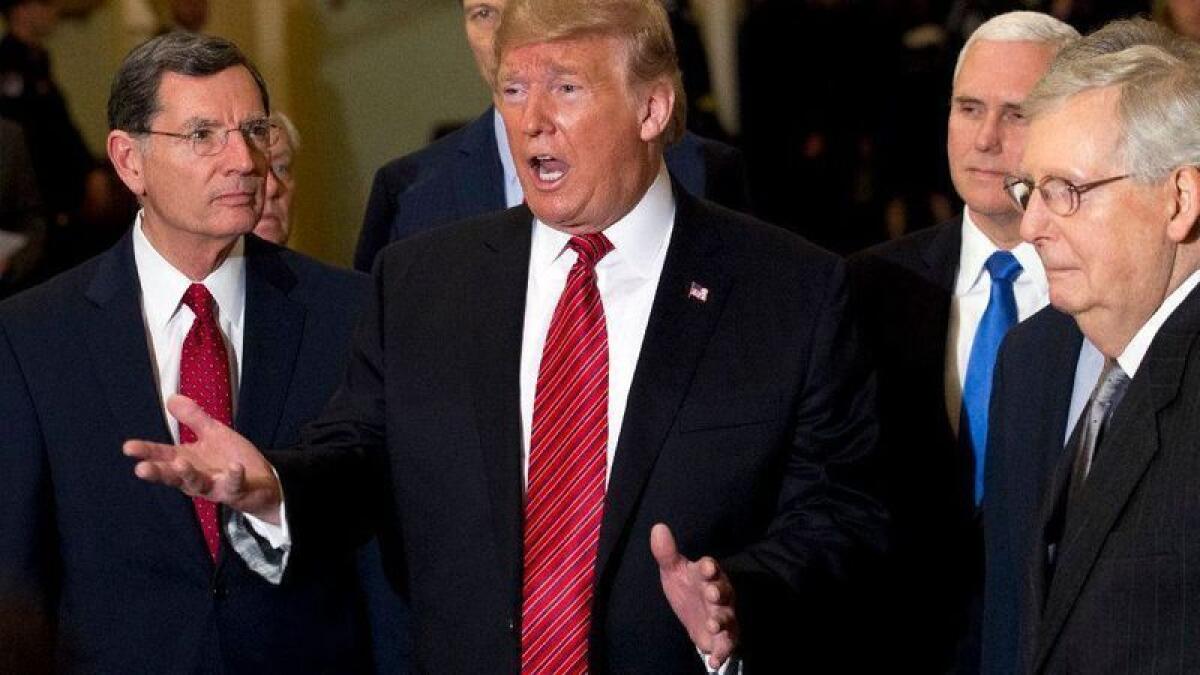
The U.S. Senate voted late Thursday to grant back pay for furloughed federal workers, which is usually what happens when the government shuts down. It’s a benevolent and fair thing to do — 800,000 employees forced off the job or having to work without pay because of a political fray shouldn’t go without income through no fault of their own.
It’s sad that granting back pay for lost hours is so routine for federal workers that it has become a custom. But that tradition should frost taxpayers who foot the bill for tens of millions of work hours in which no work was done.
President Trump reportedly has promised legislators he’d sign the measure, though it has yet to come to a vote in the House. So if it does come to pass as expected, at least federal workers victim to the shutdown won’t suffer so much financially.
But the uncertainty and the financial stress is taking a toll, particularly in agencies where morale is already low. The union for the Transportation Security Agency says some of its members — who are considered essential personnel and must stay on the job through the shutdown — have or are planning to quit rather than be forced to work without pay. Ditto for the air traffic controllers. And two other unions representing a wide range of federal workers, including Customs and Border Protection officers, have filed lawsuits against the government over the practice.
That shouldn’t surprise. This is the third shutdown in a year for federal workers (albeit one of them lasted only a few hours) and it’s understandable that the stress from such uncertainty and employer dysfunction would have folks looking for the exit.
In an economy in which four out of five workers live paycheck to paycheck, granting back pay is the right thing to do for furloughed workers. But it’s not just federal employees who are caught in the political crossfire; in what has become another tradition, federal contractors lose business during the shutdown and don’t get paid.
So not only does the country not get the work for which it will be paying furloughed employees, private-sector contractors that the government has increasingly come to rely on take the shutdown in the wallet, with some small operators saying they are being forced to lay off workers and fear for the future of their businesses.
Meanwhile, most congressional Republicans — who can usually be counted on to look out for the health of American businesses — continue to stand with Trump over his demand for a wasteful and ineffective border wall that most Americans don’t want, while the government services they do want (and pay for) are circumscribed.
No wonder Americans are so cynical about Washington.
- Share via
Please, please turn off the water to the White House

Just call him President Deadbeat.
With the partial government shutdown sputtering along, different government agencies are unable to pay not only employees, but also some basic bills.
Apparently that includes the White House. You know, where President Trump lives.
And apparently that includes the president’s water bill.
The online site DCist reports that DC Water, the municipal utility, received an email from Treasury officials Jan. 2 indicating that the government would not be paying $5 million of its $16.5 million quarterly water and sewage bill (the federal government is the utility’s biggest customer) because of the shutdown.
The utility’s chief financial officer, Matthew Brown, delivered the news during the board’s Jan. 3 meeting (see the 15:40 mark on the meeting video here).
“That brings up an interesting question,” board chair Tommy Wells said. “Is there a time from nonpayment when we cut someone’s water off?”
“1600 Pennsylvania Avenue, is that what you’re talking about?” someone asked off-camera, drawing laughter.
As a practical matter, it would take a much longer shutdown before that happens. DC Water can shut off service after 30 days, and place a lien after 60 days, and neither seems likely since the government eventually will be good for the debt.
But it’s fun to contemplate.
- Share via
Do Democrats think Trump’s wall is immoral or just ineffective?

President Trump’s relatively subdued Oval Office speech on border security included one combative note: a challenge to the suggestion by Speaker of the House Nancy Pelosi that Trump’s proposed wall on the border with Mexico was immoral.
“Some have suggested a barrier is immoral,” the president said. “Then why do wealthy politicians build walls, fences and gates around their homes? They don’t build walls because they hate the people on the outside, but because they love the people on the inside. The only thing that is immoral is the politicians to do nothing and continue to allow more innocent people to be so horribly victimized.”
Even though Trump didn’t mention Pelosi by name, it seemed obvious that he was referring to her. Last week she said that “a wall is an immorality between countries,” adding: “It’s an old way of thinking. It isn’t cost-effective.” This isn’t a new position for her. In a “Meet the Press” interview in April 2017, she said: “The wall is, in my view, immoral, expensive, unwise.”
Even if it would have required some extemporizing, you might have thought Pelosi would have responded to Trump’s point about the morality of the wall when she and Senate Minority Leader Chuck Schumer delivered their televised response to the president.
But Pelosi didn’t engage on that issue, focusing on the importance of reopening the government, alternative ways to secure the border and the fact that women and children seeking to enter the United States are not a security threat, but a humanitarian challenge. She called the wall expensive and ineffective, but not immoral. Schumer seconded her on “ineffective” and added “unnecessary.”
There’s a huge difference in messaging between calling a wall ineffective or unnecessary and calling it immoral. The latter claim is associated with the view that most if not all would-be migrants should be welcomed to the United States and that claims for asylum should be assessed generously. It’s a view popular on the activist left of the Democratic Party but harder to sell to more moderate voters.
It also reflects a religious view of immigration. After Trump’s speech, Catholics opposed to the wall launched a Twitterstorm with the hashtag #CatholicsOpposeTheWall. It was clear that most of their objections were moral and religious, not pragmatic, and extended far beyond the issue of the wall. One quoted the Gospel of Matthew: “I was a stranger and you did not invite me in, I needed clothes and you did not clothe me, I was sick and in prison and you did not look after me.”
In fact, the U.S. Catholic bishops, while paying lip service to border security, long have espoused what is close to an open borders policy, as I wrote here.
But it’s one thing for clerics to view the wall and immigration policy broadly through the lens of the Gospel’s injunctions about welcoming the stranger. For the Democratic Party to take that view is another matter. Many voters, even if they oppose Trump’s wall and other policies such as the separation of families at the border, still are uneasy about illegal immigration.
Is that why Pelsoi and Schumer didn’t harp on the “immorality” of the wall in their remarks?
- Share via
‘Forrest’ Trump promises to strip away California’s FEMA wildfire recovery funds
It sure didn’t take long for Gov. Gavin Newsom to get under President Trump’s skin.
On Tuesday — his second day in office — California’s new governor traveled to Placer County to propose spending an additional $105 million on wildfire safety, including more money to thin dry forests and improve emergency alert systems. That would be on top of the $200 million that lawmakers approved last year.
Newsom also called on President Trump to boost federal funding for forest management, which is vital, given that about 60% of California’s forests are on federal land. Newsom co-signed a letter to Trump, along with fellow Democratic Govs. Jay Inslee of Washington and Kate Brown of Oregon, calling for the Trump administration to “double the investment” in managing federal forests in the West to help supplement state efforts.
After all, the letter noted, California has spent $111.3 million since 2017 on forest health, and almost half the work was done on federal land. Yet at the same time, the U.S. Forest Service budget has been cut by more than $2 billion since 2016.
Trump’s response?
The president misspelled “Forest” as “Forrest” in his original tweet. He deleted it and tweeted the same statement again with the correct spelling. But not before he created a bunch of new memes.
Trump’s tweet is not only cruel and vindictive — thousands of Californians have lost their homes and businesses and are relying on FEMA assistance to rebuild their lives — it’s also incorrect.
California is getting its act together. The state is putting up record levels of funding to reduce fire risk and better prepare communities for the threat of larger, more destructive fires driven, in part, by climate change.
Trump has repeatedly railed against the “gross mismanagement” of forests in California. But he’s never explained what that means or what would be better forest management, aside from his comment about more “raking” of the forest floor. That also created a new meme. Trump seems myopically focused on forests and logging when some of California’s largest fires have been in the brush and grasslands.
This is typical Trump Twitter bluster, set off by the mildest of criticism by California’s new governor. Get ready for a bumpy ride.
- Share via
The U.S. doesn’t have a border crisis. It has a Trump-sized crisis of democracy
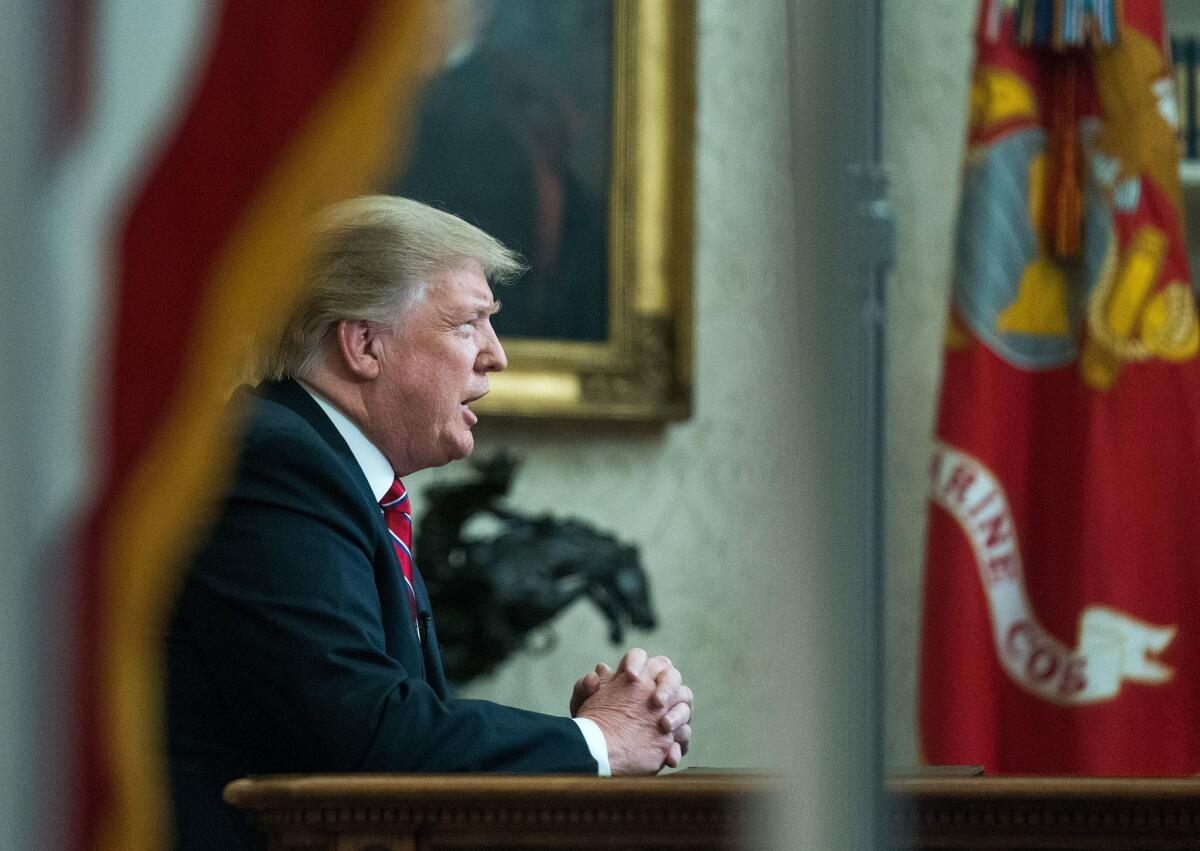
President Trump’s speech Tuesday night, and the congressional Democratic leaders’ response, offered nothing to the nation that it didn’t already know – that our government is broken, and there’s not much reason to have faith that it’s going to get any better.
The current manifestation is that the nation elected as president someone who has no idea how to do the job, and who is not predisposed to grow into it. Any stray thought that comes to mind gets trotted out as fact or edict, forcing the few people on Trump’s skeleton staff who have an inkling of how governing works to scramble to corral him, persuade him that he can’t do what he wants to do, or find some loophole through which they can drive whatever bugbear Trump is obsessed with at the moment.
We do not, as the president would have us believe, face a national security crisis at the U.S.-Mexico border. But we do face a crisis in competence. This administration – as did the Obama administration before it – has been unable to come up with a solution for the number of people arriving at the border to seek asylum.
In Trump’s case, his xenophobia and his politicization of the desperate people seeking to exercise their legal right to ask the U.S. for protection has made the problem worse. Separating children from their parents as a deterrence measure. Imprisoning children for weeks in apparent violation of the 1997 Flores court agreement limiting detention of minors facing deportation. Insisting on a wasteful expanded wall to stem illegal immigration that comes less and less across ill-guarded stretches of the border and more and more through legal channels, then fail to leave as scheduled.
In fact, illegal immigration is broadly down over the last quarter-century as the number of border agents has quadrupled. And Customs and Border Protection statistics show drug seizures by Border Patrol agents, a proxy for drug smuggling, dropped from 2.3 million pounds in 2012 to 882,039 pounds in 2017. Most of that decline came in marijuana seizures.
And most drugs are smuggled through in vehicles crossing staffed ports of entry. Adding to the existing 700 miles of wall and fencing would do nothing to affect that flow.
But the president doesn’t build policy out of facts. He builds them out of fears, aiming not to solve a problem but to shore up his shaky political standing and feed the misperceptions of his loyalists.
How do we get out of this mess? There’s no easy path. Trump’s election didn’t cause the polarization in American politics but arose from it. Public trust in government remains near historic lows since the National Election Study began in 1958, and government shutdowns – even partial ones like this one – don’t engender much faith that the people elected to run the government can actually do so.
But it does feed the cynicism and disillusionment that means presidents get elected by a minority of eligible voters, while more than two of five people who can vote don’t.
That’s the real crisis here. Trump on Tuesday framed illegal immigration and its (exaggerated) effects as “a crisis of the heart, and a crisis of the soul,” but in truth we face a crisis of the democracy. And that’s something else that a border wall won’t fix.
- Share via
It’s been a good week for poultry at the Supreme Court
Not just ducks and geese prevailed when the U.S. Supreme Court rejected a challenge to the California law banning the sale of foie gras and force-feeding birds to get it.
On Monday, the high court also rebuffed a group of state attorneys general who brought suit against the California law requiring that all eggs sold in the state come from hens kept in cages big enough for them to turn around and spread their wings. And the court said no to a similar group of states, led by the Indiana attorney general, challenging a new Massachusetts law that will prohibit the confinement of pigs, calves and hens in cramped quarters and ban the sale of meat and eggs from animals kept under those conditions.
Interestingly, Justice Clarence Thomas voted to hear those two cases, according to the court’s announcement of its decision. No further explanation was given.
The state attorneys general have been squawking for years about the California egg law, claiming it violates interstate commerce laws. The Indiana state attorney general who led the challenge to the Massachusetts law also made the same claim. And in Congress, Rep. Steve King (R-Iowa) has tried unsuccessfully for years to get a provision into the farm bill that would prohibit states from regulating agricultural products sold in their states. He was really after the California egg law, because many egg farmers in Iowa don’t want to retrofit their barns to California’s requirements.
None of the opponents of these animal welfare measures have gotten anywhere in court or in Congress. It’s good news for animal welfare statutes that the Supreme Court (for whatever reasons) won’t hear challenges to them. But that doesn’t mean it’s the end of the litigation road for advocates for farm animals. Trivia note: The Supreme Court case was filed in 2017 by Missouri’s attorney general at the time, Josh Hawley, the Republican who beat Democratic incumbent Claire McCaskill to become Missouri’s junior senator. The new attorney general, Eric Schmitt, vowed on Tuesday to keep up the fight for consumers and farmers.
Well, so far it’s been a losing battle on all fronts. And I’m not sure how many consumers are still clinging to the old, inhumane way of raising egg-laying hens. Dozens of restaurant chains, grocery store chains and food manufacturers have switched to cage-free suppliers or are in the process of doing so, all in reaction not just to state laws but also to those consumers who have made it clear that they care about their food — as well as the welfare of the animals that provided it. And California voters just passed a ballot measure, Proposition 12, which expressly requires that all eggs sold here come from cage-free hens and that all veal and pork products sold here come from calves or breeding pigs (or their offspring) that were not confined.
All these laws and changes spring from a growing consciousness of the welfare of farm animals. There’s no winning a fight against that.
- Share via
Carbon emissions are up. Don’t blame Trump, this is on all of us

Americans seem to be stuck in one of those “do as we say, not as we do” conundrums when it comes to recognizing the connection between climate-altering carbon emissions and how we conduct our lives.
New findings published Tuesday estimate that U.S. carbon emissions increased 3.4% last year, driven primarily by a booming economy, which consumed more electricity, and people buying less-efficient vehicles and driving more miles, including shippers. Despite recent gains in adding renewable resources, coal and natural gas still account for 62% of domestic electricity production, which means increased demand causes increased emissions.
The findings track with preliminary estimates released last month and with reports at the international climate forum in Katowice, Poland, that humankind is failing to take sufficient steps to avoid the worst effects of global warming.
So what’s the conundrum? We know that climate change is real, we know that human activity is propelling it, yet we persist with activities that add to the problem and fail to take sufficient steps to mitigate it. Having climate-change skeptics and industry lobbyists directing federal environmental policy doesn’t help, but President Trump isn’t the one leading consumers to pick gas-guzzlers over gas-sippers.
That’s a consumer choice. So even as we recognize that burning gasoline in our engines adds to global warming, we’re moving away from the more efficient vehicles in favor of the less-efficient but larger SUVs and light trucks. Though I should note that the larger vehicles were getting more fuel-efficient under increasingly stringent Obama administration fuel-efficiency standards, which Trump has moved to freeze.
Consumers are showing some interest in electric vehicles, but they remain expensive and we still don’t have the infrastructure in place – to wit, plentiful and publicly accessible charging stations – to make them more practical for more consumers. Even at home, people without a garage or driveway are unable to charge the vehicles, let alone folks who live in multi-unit rental properties.
Another part of the problem is that technology has yet to come up with batteries that give cars the kind of range that a tank of gas provides, though engineers are working on it. And as voters, we don’t put enough pressure on politicians to use the power of government to move markets away from products that are killing us in favor of those that might keep the world habitable for humans for a longer period of time.
But in the end, we know what we’re doing to ourselves, yet we do it anyway.
- Share via
For a self-described ‘deal maker,’ Trump appears to have no idea how negotiation works
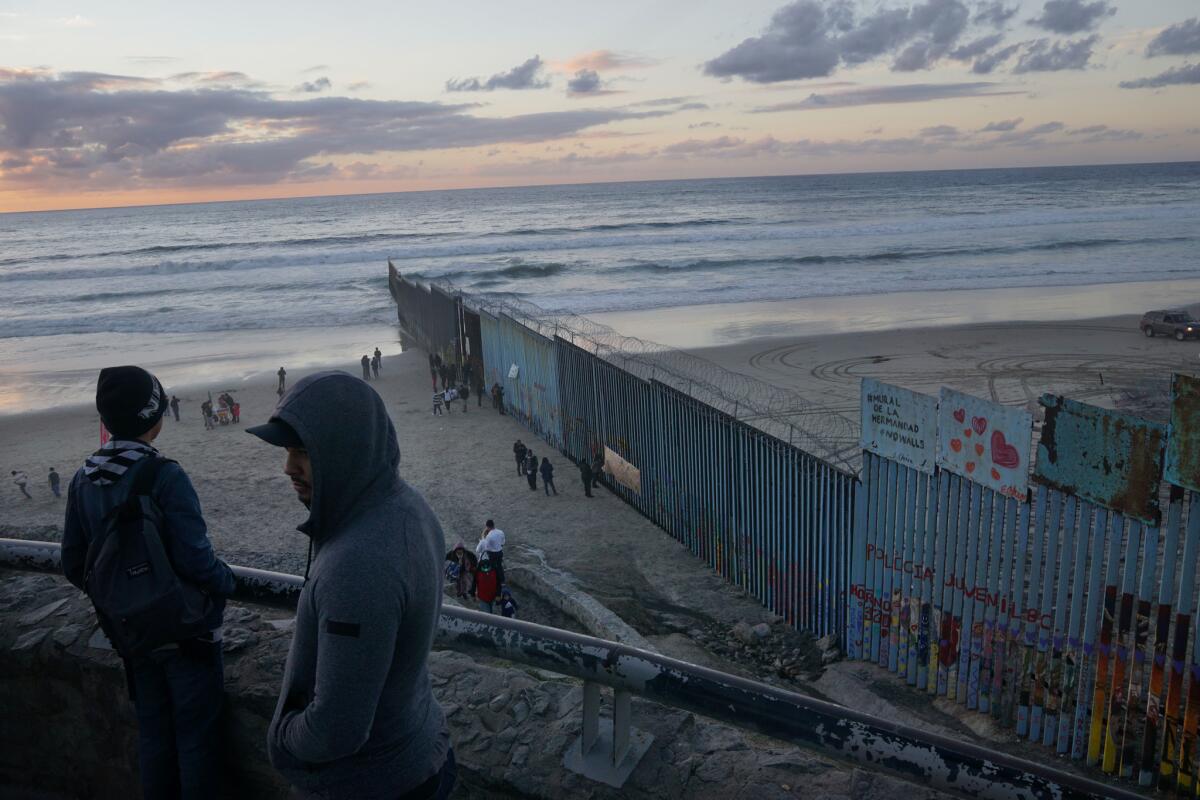
“We will have so much winning if I get elected that you may get bored with the winning,” then-candidate Donald Trump declared at a campaign event in September 2015.
It was a line that Trump would repeat many times in one form or another, and since the election it has encapsulated the uniquely binary approach he’s taken to the presidency. He appears to view much of governing as a contest in which one side, and only one side, emerges victorious.
Which is odd, given that someone who claims to be a master deal maker would understand how important it is to avoid zero-sum situations. That’s where we appear to be today, with no end in sight to a partial government shutdown that’s beginning its third unhappy week.
Trump boxed himself in by insisting that Democrats agree not to improving border security, but to taking a specific approach to border security — a wall. Democrats didn’t help things by turning a border wall into something that’s not just ineffective but “an immorality,” in the words of new House Speaker Nancy Pelosi. The result is that there is no possible middle ground.
But Trump chose that path deliberately. Remember, White House Press Secretary Sarah Huckabee Sanders said a week before Christmas that Trump did not want a shutdown and would find another way to fund the wall. The backlash from xenophobic elements in Trump’s base was so fierce, he withdrew that offer as quickly as he’d extended it. The wall became the defining symbol of the shutdown and, possibly, Trump’s presidency.
So here we are, with both sides dug in like the Battle of Verdun circa 1916. That one didn’t end quickly or well.
In a capital filled with reasonable people, Democrats would be happy to fund a wall where it makes sense from a border security standpoint, and the president would recognize that there are plenty of places where a wall makes no sense whatsoever. Both sides would also agree that you can’t solve border problems just by tackling the security aspect. That’s why we on The Times Editorial Board keep arguing for a comprehensive overhaul of U.S. immigration law, a process that is likely to take months.
Sadly, Washington is not filled with reasonable people. Instead, it is filled with would-be winners and losers, and at the moment, they’re all in the latter category.
- Share via
How’s this for bad optics: Trump’s top lieutenants getting big raises during the shutdown

How’s this for bad optics: As the partial government shutdown enters its third week and some 800,000 federal employees remain off the job (or are working without pay), top political appointees and Vice President Mike Pence are about to get huge raises.
According to the Washington Post, pay levels that had been frozen since 2013 will increase Saturday unless Congress votes yet again to freeze them. That’s not likely to happen.
The bumps could amount to $10,000 a year or more, depending on the position, with cabinet secretaries going from $199,700 a year to $210,700 a year. The increases are so high because they encompass several years’ worth of delayed raises that now will go into effect all at once.
In the grand scheme of things, the increases aren’t particularly objectionable. Senior executive positions in government are important and salaries should (reasonably) reflect that, if we want to attract the best candidates (even if the president appointing them doesn’t select the best people).
Congress had frozen senior executive pay levels in the wake of the last recession, and continued the freeze in subsequent spending bills. The freeze was included in the most recent measure that failed to advance at the end of the last Congress. (Senate Democrats refused to support it because of Trump’s insistence that it include $5 billion for the U.S.-Mexico border wall.)
Without approval of that spending bill, the executive pay freeze gets lifted.
And Trump’s top appointees get raises while his intransigence forces more than a third of federal employees off the job. #winning.
- Share via
If Trump thinks migrants in the U.S. illegally are dangerous, why has he hired so many of them?
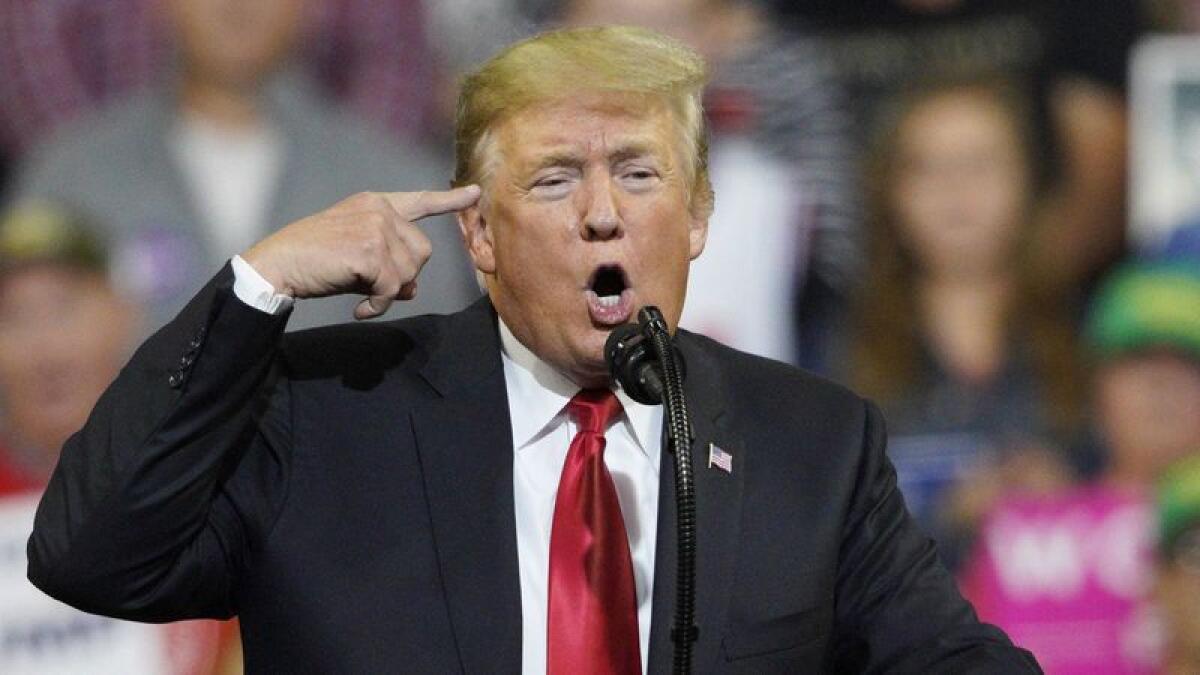
By now much of the nation recognizes President Trump as the embodiment of hypocrisy, but still, sometimes his blatant duplicity needs to be pointed out.
For instance, Trump railed as a candidate and as president about people living in the country without permission, calling them rapists and violent gang members.
Last year, in a White House meeting discussing so-called sanctuary cities and states with sheriffs and other local California officials, the president said:
“We have people coming into the country or trying to come in, we’re stopping a lot of them, but we’re taking people out of the country. You wouldn’t believe how bad these people are. These aren’t people. These are animals.”
If immigrants in the U.S. illegally are so violent and such a danger to society, why did managers of Trump National Golf Club in Bedminster, N.J., surreptitiously remove the names of undocumented workers from a list of employees sought by the Secret Service?
The New York Times, which last month broke the story that golf club managers knowingly hired workers who had entered the country illegally (including the Guatemalan woman who makes Trump’s bed when he’s there and who received a White House certificate for her “outstanding” service), reported Thursday that the club’s human resources office failed to include the names of workers in the U.S. illegally on the list requested by the Secret Service as a security precaution.
No doubt that’s because, as part of the vetting, the Secret Service was requesting Social Security numbers; workers in the country illegally do not have valid Social Security numbers.
Nothing untoward has happened to the president, and I hope nothing does, but the revelations that Trump National managers knowingly hired people who had entered the country illegally, including a woman who made some of the president’s meals, and then hid their status from even the Secret Service is the kind of security lapse that normally would have conservatives fuming.
And then there’s the blatant hypocrisy of the president profiting from the labor of such workers even as he rails against them as a threat to public safety.
In fact, Trump has profited before from the labor of people working in the U.S. without permission, including clients of his modeling agency and Polish laborers who demolished a store to make way for his flagship Trump Towers project in Manhattan (Trump paid nearly $1.4 million in a legal settlement for that one).
I’m still waiting for Trump to tell us which of the migrants working for him after entering the country illegally — and whose names were withheld from the Secret Service — were the rapists and the gang members.
- Share via
After China’s moon landing, let’s take a minute to give space exploration the awe it deserves
Five months before I was born, the Soviet Union launched Sputnik, the first artificial satellite to orbit Earth. In 1969, as an 11-year-old, I watched the black-and-white images of American astronaut Neil Armstrong stepping onto the surface of the moon. That was a huge advancement in a remarkably short time.
Space exploration has continued to evolve with missions to Mars and Venus, placing space stations and telescopes in orbit, and dispatching probes to the far reaches of the solar system. There have been so many advances, in fact, that we sometimes take them for granted. We have lost our sense of awe. Which is too bad, because there have been a number of recent developments that deserve some appreciation.
For instance, China just became the first country to conquer the technical difficulties of landing a spacecraft on the far side of the moon — not the dark side, as Pink Floyd described it. The far side of the moon gets sunlight on a regular basis as it orbits the Earth while the Earth itself orbits the sun. So when the moon is full to our eyes, the far side is dark; when it’s a new moon — shadowed to our eyes — sunlight is striking the far side.
But because the far side never faces Earth, it’s impossible to get a direct radio signal, which is what scientists use to control and receive reports from spacecraft. So how did the Chinese handle that hurdle? First, they sent a satellite into an orbital position from which it can receive signals both from Earth and the far side of the moon (you can read about that science here). Then they used the satellite as a relay tower of sorts — a simple yet elegant solution.
Meanwhile, NASA’s New Horizons spacecraft is sending back to Earth pictures of the snowman-shaped Ultima Thule — which is about as long as Catalina Island — orbiting in the Kuiper Belt far beyond the farthest planet in the solar system. That mission, incidentally, launched in 2006, and included a 2015 exploration of Pluto.
Yet New Horizons wasn’t the first spacecraft to reach that distance from Earth. NASA’s Voyager 1 and Voyager 2 spacecraft launched in 1977 — the start of my sophomore year of college — to explore Jupiter and Saturn, with Voyager 2 going on to investigate Uranus and Neptune.
They sent back remarkable photos and invaluable data, and then they kept flying, with Voyager 1 leaving the far boundaries of the heliosphere for interstellar space in August 2012, and Voyager 2 following this past November. The heliosphere, as NASA describes it, is “the protective bubble of particles and magnetic fields created by the Sun.”
And they continue to send data back to Earth using signals that take, in the case of Voyager 2, 16½ hours to travel more than 11 billion miles, helping scientists understand conditions that they heretofore could only imagine or speculate about.
That is the dictionary definition of awesome.
- Share via
Trump says Mexico will pay for his border wall thanks to the new NAFTA deal. It won’t

President Trump claimed yet again Wednesday morning that Mexico is paying for a wall along the shared border through his renegotiated NAFTA trade deal (which he re-branded as USMCA) with Canada and Mexico.
No, it’s not.
Oh, and about that “much of the Wall has already been fully renovated or built” claim? Um, no. The relatively small amount of wall-and-fence work done since Trump took office has been primarily repairing or renovating existing structures.
It’s true that nearly 700 miles of the 2,000-mile-long border has been walled or fenced, but most of that went up during the Bush and Obama administrations.
- Share via
How Trump’s constant lying might forever damage the presidency
It’s fitting that President Trump is finishing up 2018 with inaccurate statements launched at the nation via Twitter. And it’s also pathetic.
The government is partially shut down because the president insists, like an intemperate 4-year-old, that he must have his way and waste billions of dollars in tax money extending existing walls and fences along the U.S.-Mexico border, even though there is no evidence such a monstrosity would achieve what he thinks it will. He tweeted again Monday morning about the “open border,” which he described as an “ ‘Open Wound,’ where drugs, criminals (including human traffickers) and illegals would pour into our Country.”
In fact, the number of illegal border crossers has been steadily decreasing, and most drugs come across at ports of entry smuggled inside of motor vehicles, through tunnels beneath the existing walls and fences, and by boat. Not much impact from a wall there.
Trump also tweeted about his announced withdrawal of U.S. troops from Syria, complaining that “Now when I start getting out the Fake News Media, or some failed Generals who were unable to do the job before I arrived, like to complain about me & my tactics, which are working.” Actually Trump is being criticized for the suddenness of the withdrawal; his abandonment of Kurdish allies in the region, setting the stage for a likely attack by Turkey; the appearance that in walking away he has handed a victory to Russia and Syria; and his rejection of advice from the Pentagon. So the president distorts the criticism of his actions to make himself look like a woebegone victim.
But that the president lies, or at a minimum distorts the truth, has become so common that what once was received as outrageous now gets a shoulder shrug, a recognition that the president cannot be shamed for his falsehoods because he’s impervious to personal embarrassment.
The Washington Post has doggedly tracked the president’s utterances and reports that Trump has made an average of 15 errant statements per day since the start of the year. Fewer than a third of Americans believe the president’s untruths, according to a Post poll, which means that an overwhelming majority of Americans know their president lies. Yet few of them seem interested in holding him to account.
Whatever happens in the 2020 election – Sen. Elizabeth Warren (D-Mass.) announced her candidacy Monday morning, the first of several likely high-profile Democratic challengers – Trump has perhaps irretrievably damaged the relationship between the presidency and the people. Yes, Richard Nixon lied, as did Bill Clinton, but no other president has lied with the persistence and impunity of Trump.
He lies about matters big and small. He lies to try to make himself look better – remember the crowd size claims at his inauguration? – and he lies to disparage his critics. He lies about things that don’t matter, almost as a verbal impulse. He brings to mind comedian Jon Lovitz’s Tommy Flanagan character, a member of Pathological Liars Anonymous, whose every statement is an embellishment or outright lie.
Lovitz did it as comedy; Trump does it as reflex.
So here’s a wish for the new year: That more of Trump’s fellow Republicans in Congress call out his lies for the damage they do to the country, and to the presidency. And that his voters finally begin to care that he lies to them too, and start holding him accountable for it.
- Share via
Don’t make a mountain out of a MAGA hat

There’s a maxim in the law that goes “de minimis non curat lex.” A common translation from the Latin is “the law does not concern itself with trifles,” but a more colloquial equivalent is: “No big deal.”
Lawyers and judges sometimes talk about “de minimis” violations of procedure or the Constitution.
Unlike some commentators, I think President Trump committed a de minimis violation of protocol when he autographed “Make America Great Again” hats during his visits to U.S. service members in Iraq and Germany this week.
Assuming, as the president insisted in a tweet, that his aides didn’t distribute the hats (an accusation he attributed to “Fake News” reports), his decision to oblige service members who offered them for his signature doesn’t bother me.
As Trump said: “If these brave young people ask me to sign their hat, I will sign,” he tweeted. “Can you imagine my saying NO?” Actually I can’t, any more than I imagine Barack Obama refusing to sign a HOPE poster if it were thrust at him by a service member.
“De minimis” also applies, in my view, to the infraction supposedly committed by the service members in bringing political paraphernalia to a meeting with the president. (It wasn’t just hats; a Bloomberg News reporter posted a photo of a woman in uniform at Ramstein Air Base in Germany welcoming the president with a MAGA flag.)
Trump signing MAGA hats is a trivial boundary violation compared with his use of the troops as a captive audience for partisan propaganda about his dispute with Democrats over a wall at the Mexican border.
“I don’t know if you folks are aware of what’s happening,” Trump said in remarks at Al Asad Air Base in Iraq’s| Al Anbar Province. “We want to have strong borders in the United States. The Democrats don’t want to let us have strong borders — only for one reason. You know why? Because I want it.”
That politicization of a speech to the troops was outrageous. So if you’re going to slam Trump, focus on that, not on his signing a few hats.
- Share via
Here are just a few of the ways our immigration and asylum systems fail to deliver basic justice
Two court actions a continent apart are driving home — yet again — the point that the U.S. asylum system neither lives up to basic standards of human decency and due process nor, it seems, to the promises of the Constitution.
In New York on Thursday, a federal district court judge slammed the government for failing to even offer a bond hearing to a man it had detained for 34 months after he arrived at the U.S.-Mexico border and asked for asylum because of threats he’d received in his native Ivory Coast over his political affiliations.
Is that sufficient grounds for granting asylum? Good question, and we have both laws and a court system to guide the answer. Was it necessary for the government to detain Adou Kouadio, 43, while his application worked its way through the system?
No one knows because the government has not been forced to answer two basic questions: Does Kouadio pose a flight risk? And does he pose a danger to public safety? Both those fundamental questions determining whether an asylum-seeker or other migrant will remain incarcerated get addressed in a bond hearing.
Which the government has not granted. For 34 months.
U.S. District Court Judge Alvin K. Hellerstein on Thursday ordered a bond hearing be held within 14 days, a ruling legal experts said was both a rebuke to federal detention policies and a recognition that fundamental rights of due process extend to migrants.
“Petitioner has a clean record, never having been arrested or convicted,” Hellerstein wrote. “There is little risk of flight, since he seeks asylum within the United States, and little risk of danger to the community, judging from his lack of a prior criminal history. Yet, Petitioner has suffered 34 months of detention without an opportunity for a bond hearing while waiting for a final decision on his petition for asylum.”
The judge noted that the government had an interest in weighing due process rights against the national interest but that it had failed to make the case that Kouadio posed a particular threat.
“This nation prides itself on its humanity and openness with which it treats those who seek refuge at its gates,” Hellerstein wrote. “By contrast, the autocracies of the world have been marked by harsh regimes of exclusion and detention. Our notions of due process nourish the former spirit and brace us against the latter. The statutory framework governing those who seek refuge, and its provisions for detention, cannot be extended to deny all right to bail.”
Meanwhile, here on the West Coast, the American Civil Liberties Union has filed a lawsuit in U.S. District Court in Riverside to protect another right of migrants. The suit accuses the federal government and some of the organizations it relies on for detaining people facing deportation — private prison operator Geo Group and the Orange County Sheriff’s Department — of making it nearly impossible for migrants to consult lawyers, which they have a right to do.
Geo Group operates the Adelanto ICE Processing Center in San Bernardino County, and the Orange County Sheriff’s Department operates the Theo Lacy Facility in Orange and the James A. Musick Facility near Irvine; all three facilities house migrants at ICE’s behest.
According to the complaint (which you really ought to read), three men seeking asylum have been unable to use telephones to find or consult with attorneys under bizarre systems in which the phones hang up automatically at the sound of an automated response, detained migrants are forced to make their calls within hearing of others (undermining fundamental attorney-client privilege), and detainees often don’t gain access to phones until after normal business hours.
Also, mail is slow to get delivered and sometimes arrives opened and damaged, further hindering the detainees’ ability to present their cases, the lawsuit charges.
These are no minor things. Hanging in the balance is the ability not only to get proper legal advice, but also to collect the sorts of documents often required to support an asylum claim. Detainees have missed court deadlines because of slow mails and inability to gather their documents from far-flung sources.
And I should note this isn’t a Trump thing. ICE officials, and their contracted detention overseers, have been acting in such manners for years. One of the plaintiffs, Jason Nsinano of Namibia, was initially detained under the Obama administration, as was Kouadio, the man for whom the New York judge ordered a bond hearing.
Though that hearing might not do much good. Shortly after his detention, ICE determined that Nsinano posed neither a flight risk nor a danger to public safety and set bond at $10,000 — an amount that Nsinano doesn’t have.
So Nsinano has been incarcerated for more than three years not because he has been charged with a crime, nor because he poses a flight risk or danger to society, but because he sought asylum and didn’t have the foresight to bring $10,000 with him.
That’s outrageous.
- Share via
The appalling normalcy of gun violence in America
Less than two months ago, Ian Long walked into the Borderline Bar and Grill in Thousand Oaks and began firing two semiautomatic handguns, killing 11 people in the bar and wounding an arriving sheriff’s deputy (who tragically was killed when struck by a round fired by another arriving officer) before turning one of his guns on himself.
Raging wildfires that led 75% of Thousand Oaks’ residents to evacuate less than two weeks later overwhelmed the tragedy in the public’s mind, which is a tragedy of another sort. Yes, the fires were awful. Statewide they killed more than 100 people, 86 in the Camp fire alone, while damaging or destroying nearly 20,000 buildings worth at least $9 billion (in the areas hit by the Camp, Woolsey and Hill fires). About 1.8 million acres burned in total, a record.
Wildfires have always been a part of nature in California. One could argue that gun violence is part of California’s nature too, though the latter is something we could do more to control. But first we have to pay closer attention to the problem.
So far this year California has endured 24 incidents in which at least four people were hit by gunfire, one of the definitions of a mass shooting. The Borderline attack was the deadliest, accounting for a quarter of the 50 deaths statewide in such shootings this year. An additional 136 people were shot in those incidents but survived, according to statistics gathered by the Gun Violence Archive.
It’s not just us. Nationwide, there have been 337 mass shootings killing 354 people and wounding or injuring 1,341. That’s a lot of carnage arising from anger or mental illness and too-easy access to firearms.
And the scope of our problem is even broader, because most of our killings and shootings occur in ones and twos. As of early Friday morning, the Gun Violence Archive had counted 56,026 incidents of guns fired at humans nationwide this year, or about 155 a day. That’s a pace of 6.4 shootings an hour,
The body count? An astounding 14,392 people killed — and that doesn’t include gun suicides, which amount to almost twice the number of people shot by others. An additional 27,766 people were wounded or injured in those 56,062 gunfire incidents.
So the total tally so far is 42,158 people killed or wounded by others firing guns so far this year, or 166 people per day, a pace of 4.8 victims per hour.
The most appalling part? This is what we accept as normal.
Happy New Year.
- Share via
Trump is keeping the government shut down over an immigration crisis that doesn’t exist
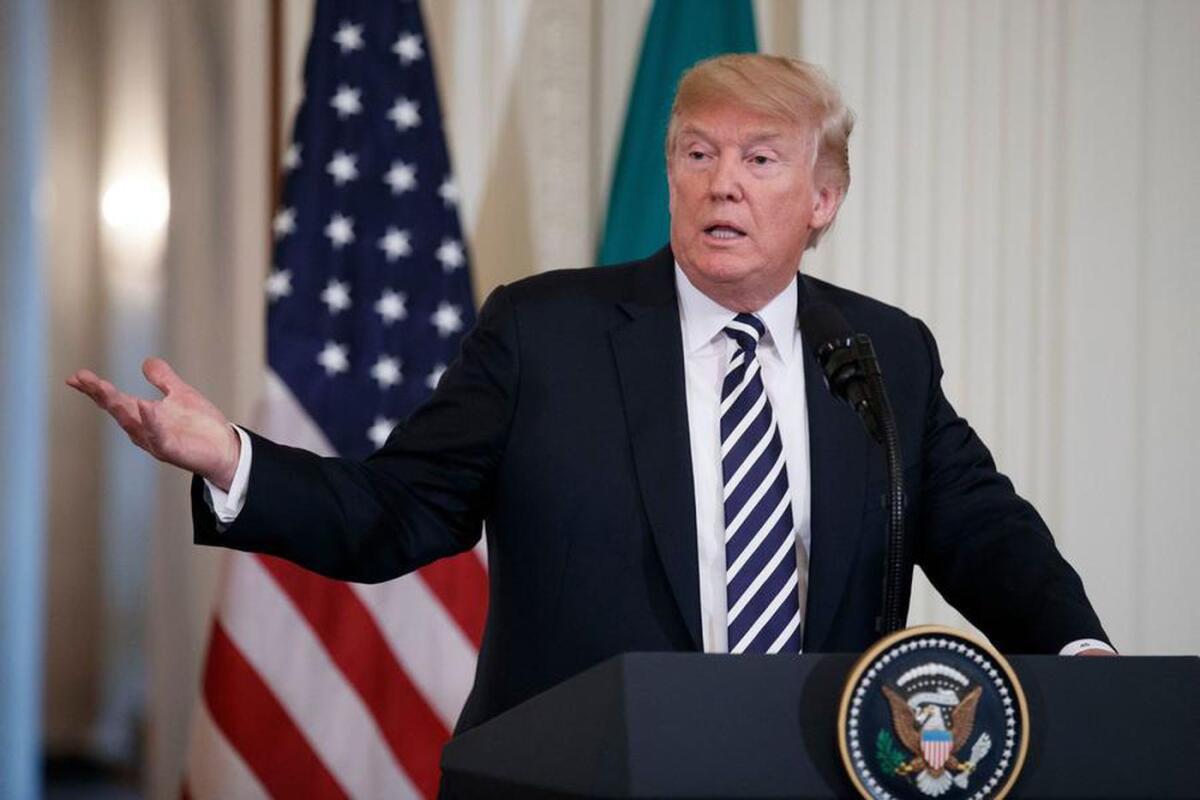
The federal government remains in a partial shutdown as President Trump digs in his heels (good thing those bone spurs got better) over his silly wall, refusing to agree to a spending bill that doesn’t include $5.7 billion for what assuredly would be a waste of tax dollars. At some point, one of the few adults left at 1600 Pennsylvania Avenue needs to explain to the president the difference between compromise and capitulation.
And yes, the Senate Democrats are holding firm, too, in their opposition to the wall. The difference, though, is the Democrats recognize the folly in Trump’s obsession, one that the president re-embraced Thursday afternoon in a public statement that makes a pretzel of the truth about the border and public safety.
“The president has made clear that any bill to fund the government must adequately fund border security to stop the flow of illegal drugs, criminals, MS-13 gang members, child smugglers and human traffickers into our communities — and protect the American people,” the White House said, adding: “The administration understands this crisis and made a reasonable, common-sense solution to Democrats five days ago — we’ve not received a single response.”
But the administration clearly doesn’t understand “this crisis,” because it doesn’t exist.
Illegal immigration is at its lowest level in a decade. Young families are arriving at the border in larger numbers — while still constituting a sliver of the overall flow of migrants — but a wall built at some point in the future won’t do anything to fix that. (To its credit, the administration has made small yet positive steps to invest more in Central American governments and economies.)
The vast majority of drugs and other contraband smuggled into the country come through ports of entry, or via tunnels dug under existing walls and fences. Covering more border with a wall — or making it 30 feet tall, as the president wants — doesn’t address either of those smuggling routes.
The reality of the situation — which Trump eschews with reckless abandon — is that most people living in the U.S. without legal status enter the country with permission, and then don’t leave. Not much role for a wall there, either. Do some walk across? Certainly — and then often give themselves up to border agents and seek asylum.
And regardless of their status, immigrants commit crimes at lower rates than native-born Americans.
The president also sought to portray his decision to stay in Washington over Christmas as an effort to work with Democrats in the Senate (he will need seven Democratic or independent votes in the next Senate to get money for his wall into the bill funding government operations for the rest of the fiscal year). Trump, the White House said, is “hoping to negotiate a deal that would stop the dangerous crisis on the border, protect American communities, and reopen the government. The Democrats decided to go home.”
Yes, most did — because the Republicans adjourned both the House and the Senate. That wasn’t a decision by the Democrats.
And it’s pretty certain that if Trump picked up the phone on Christmas Day — or even right now — to tell congressional leaders of both parties that he had come to his senses and would sign a bill reopening the government without funding for the wall, they’d take the call.
- Share via
Kavanaugh (and other justices) shouldn’t be exempt from an ethics code

There will be no investigation by the federal judiciary of allegations that Supreme Court Justice Brett M. Kavanaugh violated judicial ethics in testifying at his Senate confirmation hearings.
As a matter of rough justice, that might be a defensible outcome: Those complaints seemed like an outgrowth of the political opposition to Kavanaugh’s confirmation, rather than the typical allegations of judicial misconduct filed under the Judicial Conduct and Disability Act. For better or worse, the Senate decided that Kavanaugh was sufficiently credible to deserve confirmation.
Nevertheless, the reason why the complaints were dismissed by the U.S. 10th Circuit Court of Appeals — to which they were referred by Chief Justice John G. Roberts Jr. — highlights a troubling loophole in judicial accountability: Not only Kavanaugh but his colleagues on the court are exempt from an ethics code that applies to other federal judges.
The misconduct complaints dismissed by the 10th Circuit accused Kavanaugh of violating the Code of Conduct for U.S. Judges drawn up by the Judicial Conference of the United States. Among other assertions, they alleged that in his Senate testimony he falsely testified about his prior service in the George W. Bush administration; falsely testified about his “personal conduct, behavior and recollection of events prior to his joining the federal judiciary”; and “displayed partisan bias and a lack of judicial temperament.”
(Not all of the complaints arose from Kavanaugh’s confirmation testimony; some of them alleged that he had favored certain parties as a judge on the U.S. Court of Appeals for the District of Columbia Circuit.)
The 10th Circuit dismissed the complaints not based on the merits but because, now that he is a member of the Supreme Court, Kavanaugh is no longer subject to the disciplinary provisions of the law, which defines a judge covered by its provisions as “a circuit judge, district judge, bankruptcy judge or judge magistrate” — not a Supreme Court justice.
As for the underlying Code of Conduct, that too doesn’t apply to justices, although Roberts has suggested this isn’t a problem because the code serves as “the starting point and a key source of guidance” for the justices. (Roberts also implied in a 2011 statement that formally applying the code to the Supreme Court might be unconstitutional because the code was designed for courts created by Congress — whereas the Supreme Court was created by the Constitution.)
Fix the Court, a group that lobbies for reform and transparency, said that the dismissal of the Kavanaugh complaints “underscores the need for the Supreme Court to adopt its own code of conduct or for Congress to write one if the justices cannot be bothered.”
Precisely. It’s true that justices who behave corruptly can be impeached and removed by Congress, but that’s a rare remedy that probably wouldn’t be appropriate for most ethical infractions. Some other mechanism is necessary to ensure that all federal judges, including Supreme Court justices, are accountable for their behavior.
- Share via
The deaths of migrant children in custody should be a wake-up call

The body of Jakelin Caal, the 7-year-old Guatemalan girl who died in U.S. immigration custody this month, arrived in her family’s impoverished farming village on Christmas Eve just hours, as it turns out, before Felipe Gomez Alonzo, an 8-year-old Guatemalan boy, died while being detained by federal border agents in New Mexico. The two deaths have drawn significant attention to the medical care available to migrants taken into custody by the U.S. government.
Wednesday afternoon Homeland Security Secretary Kirstjen Nielsen announced that she had ordered medical screenings of all detained migrant children, which raises the question of whether such screenings had been done routinely before. One would hope that people being sent to detention, children or adults, would be screened as a matter of health policy — both for the new arrivals and for the people they would be joining in the detention centers.
Advocates have argued for months that the administration’s detention policies increased the health risks to migrants, particularly children. But the government’s desire to incarcerate migrants to deter others from trying to enter the country apparently outweighed any sense of humanitarian responsibility.
Nielsen also said that six migrants — none of them minors — died in Customs and Border Protection custody in the fiscal year that ended Sept. 30, but didn’t mention the nine other migrants who died in Immigration and Customs Enforcement custody. Just last week Nielsen testified before the House Judiciary Committee that she didn’t know how many people died while in the custody of her department’s various agencies. She promised then to report the numbers back to Congress, but a committee aide said Wednesday that the information had not yet arrived.
More troublesome, though, was the tone of Nielsen’s public statement. She turned the deaths of two children into a diatribe over “an immigration system that rewards parents for sending their children across the border alone, a system that prevents parents who bring their children on a dangerous and illegal journey from facing consequences for their actions, an asylum process that is not able to quickly help those who qualify for asylum, a system that encourages fraudulent claims, and a system that encourages bad actors to coach aliens into making frivolous claims.”
Never mind the atrocious levels of violence tied to gangs with American roots, or the devastating poverty, particularly in areas affected by climate change. Nielsen assigns blame to the courts for rulings that hew to U.S. law, and to Congress.
“As a result of bad judicial rulings from activist judges and inaction by Congress, we are seeing a flood of family units and unaccompanied alien children,” she said. “The unprecedented number of families and unaccompanied children at the border must not be ignored.”
She’s right that Congress must act and that the nation cannot ignore the humanitarian needs at the border. But she also needs to recognize that this isn’t a flood of people seeking to game a system. Rather, it is the flow of the desperate who, even if they do not clear the hurdle for asylum, have the right to be heard and to be treated humanely and with dignity.
Family apprehensions have increased, but there’s nothing in the law that says those families or individual migrants have to be detained while they seek legal permission to remain in the country (unless they had been convicted of certain crimes). Felipe and his father were apprehended by border agents on Dec. 18, and the boy fell ill six days later, on Christmas Eve morning, according to a timeline released by the Department of Homeland Security. The cause of death has yet to be determined. Jakeline died after two days in custody; the cause of death was later ascribed to septic shock.
The government’s response here should be to find faster ways to turn over apprehended families to the custody of relatives, friends or nonprofit agencies that can care for them in more hospitable settings than border-region detention centers. And it should expand the capacity of the asylum system, including the immigration courts, to get faster decisions on who is entitled to asylum.
Finally, the administration should recognize that it is dealing with a humanitarian issue and respond in kind. If it’s capable of it.
- Share via
The accumulating casualties of Trump administration trade policies
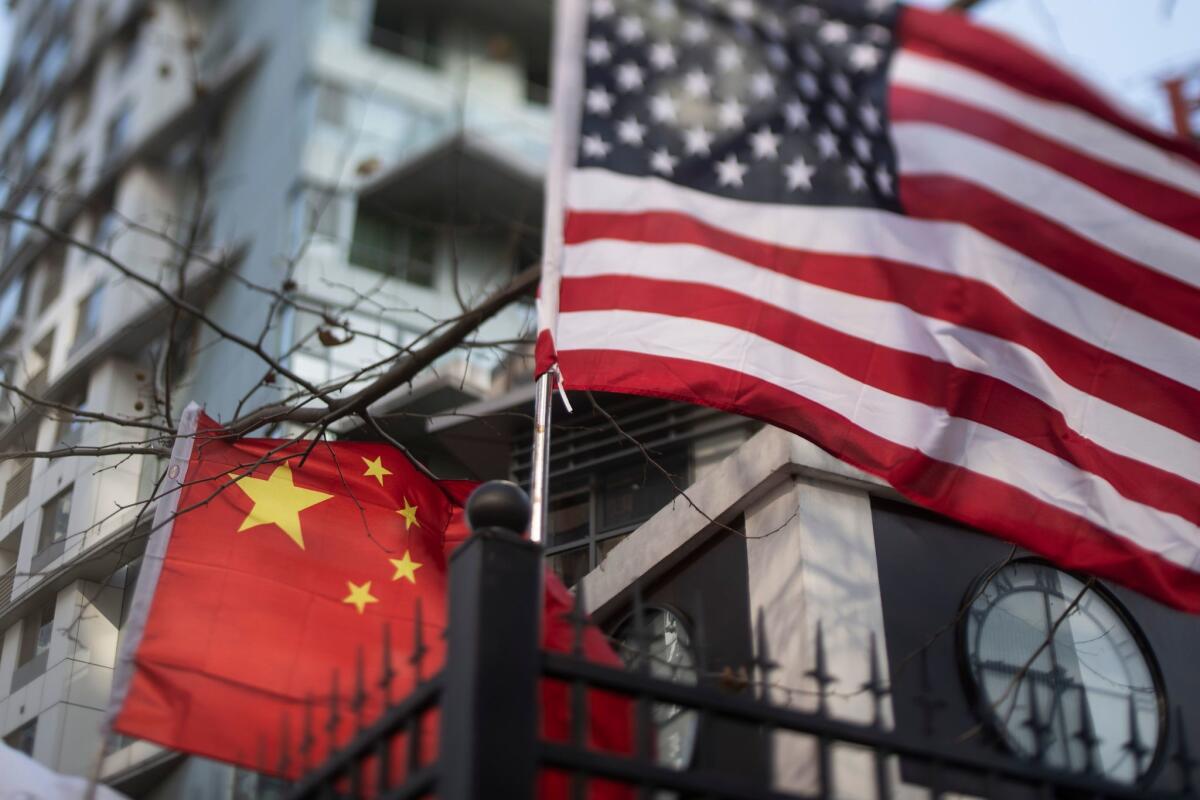
The stock market rallied Wednesday morning, but the big losses in previous days have rattled observers who consider Wall Street something of a leading indicator of the U.S. economy — a sign that at least some financial industry professionals see something in the data about future business prospects that they don’t like.
Of course, it’s risky to try to read the minds of investors or to draw quick conclusions about the swings of a volatile market. Plus, there’s this observation from the Wall Street Journal on Wednesday: “Behind the broad, swift market slide of 2018 is an underlying new reality: Roughly 85% of all trading is on autopilot — controlled by machines, models or passive investing formulas, creating an unprecedented trading herd that moves in unison and is blazingly fast.”
Nevertheless, there are headwinds building up to impede the progress of U.S. businesses in the coming years, and investors need to factor them into their thinking. One of these hurdles is significant, yet completely artificial: The trade war President Trump is fighting with much of the industrialized world.
Consider this lump of Christmas coal from Bloomberg on Tuesday:
“Bloomberg’s Global Trade Tracker is softening amid a fading rush to front-load export orders ahead of threatened tariffs. And volumes are tipped to slow further even as the U.S. and China seek to resolve their trade spat, with companies warning of ongoing disruption.”
According to reporters Enda Curran and Katia Dmitrieva, analysts say the trade war was responsible for 6 percentage points of the S&P 500’s drop this year. The disturbing signs include lowered projections for economic growth in all the major industrialized regions and slower global trade growth.
While Trump tussles with China and withdraws from or threatens to abandon multilateral trade pacts, the United States is being left behind as other nations form trading blocs with lower barriers. A good example is Japan, the No. 2 market in Asia for U.S. agricultural exports behind China.
The Wall Street Journal reported that on Sunday that Japan “will begin cutting tariffs and easing quotas on products sold by some of American agriculture’s biggest competitors — including Canada, Australia, New Zealand and Chile — as part of the new 11-member Comprehensive and Progressive Agreement for Trans-Pacific Partnership.” The TPP was a trade agreement that the Obama administration championed as a way to promote U.S. trading norms in Asia, but Trump withdrew the United States from it as one of his first acts as president.
That’s not all from Japan, though. According to the Journal’s Jacob M. Schlesinger, “Tokyo will follow up on Feb. 1 by implementing the European Union-Japan Economic Partnership Agreement offering similar breaks for the 28-nation bloc’s agricultural products, aiding American rivals in France, Spain, Italy and the Netherlands.”
The Trump administration is trying to play catch-up, announcing plans recently to seek a bilateral free-trade deal with Japan. That’s a bit like deciding to try to make nice with the family next door after bad-mouthing everyone in the neighborhood.
Even more important are the negotiations the administration is having with China to try to avert an intensification of their tariff duel early in 2019. If those talks bear fruit and the two sides lift their tariffs, it will be the equivalent of repealing a tax increase on both economies. If they don’t, the administration has pledged to increase tariffs and impose them on virtually all goods imported from China, a considerable expansion of the trade war. Those moves would only stiffen the headwinds.
- Share via
Quick, somebody go play with our bored president so he’ll get off Twitter
You know what would be nice? If the government shutdown included President Trump’s Twitter account, because the blusterer-in-chief is in fine form here on Christmas Eve. By around lunchtime on the East Coast, the president had tweeted on a number of topics, including his silly wall on the U.S.-Mexico border, offering a bizarre take on its funding:
“Shutdown money?” And, oh yeah, it’s the Democrats’ fault the president shut down the government because he can’t get his way, proving once again that he was temperamentally ill-suited for a job that requires flexibility, diplomacy and vision.
Remember, Trump took full blame for the shutdown during a televised meeting at the White House he arranged in hopes of bullying Democratic congressional leaders into partially funding the wall. So much for the art of the deal.
He also tweeted a shot at the Federal Reserve, blaming it for the current cliff-fall of the stock market. (His trade policies and decision to shut down the government couldn’t have been factors, could they?) There’s a baseless and context-free tweet about the current state of the economy, which is really about the stock market, not the economy, but still:
And he tweeted that the Saudi government “has now agreed to spend the necessary money needed to help rebuild Syria, instead of the United States,” which in reality updates a pledge the Saudis made back in August to invest $100 million in reconstruction, a move that analysts saw as an effort to counter Iran’s influence.
So why is the president all tweety on Christmas Eve? He provides the answer:
So please, someone, anyone, go over to the White House and play with our bored president. It would be a gift to the nation.
- Share via
The stock sell-off prompts another desperate tweet from Trump

For the new year, I resolve not to be baited into responding to President Trump’s idiotic tweets.
But that’s next week’s resolution. In the meantime:
I will readily concede that the president knows much more about powerful golfers who can’t putt than I do. But seemingly everything he says about the Federal Reserve and monetary policy is brain-dead.
It’s safe to assume that Trump is in a lather over the plunging stock market, which has erased this year’s gains and is starting on last year’s. Today the Dow lost almost 3%. Bad market, bad! The mind reels over what this is going to mean for the California Public Employees’ Retirement System and other big, financially challenged pension funds.
(Sorry to jump off track here, but what was Treasury Secretary Steven T. Mnuchin thinking? Calling up major banks to confirm that they have “ample liquidity available for lending” doesn’t reassure investors, it raises a question no one seemed to be asking. And adding that he’s convening top federal officials to “discuss coordination efforts to assure normal market operations”? Isn’t that the sort of thing you do without telling anybody?)
OK, so back to Trump and the Fed. Although the markets can influence the economy and the economy definitely influences the markets, they are two different things. So Trump contradicts his own administration’s messaging when he says that there’s a problem with the economy because the stock market turned bearish.
The fact of the matter is, growth is healthy. The holiday season has been great for retailers; according to Mastercard SpendingPulse, retail sales in November and the first half of December were up 5.2% over last year — including an 18% bump online. Meanwhile, Macroeconomic Advisers has estimated that GDP growth in the fourth quarter will be 2.8%, which is not great but not bad. With unemployment well under 4% and inflation slipping back below 2%, the main numbers are all reassuring.
The Fed has been a problem lately for the stock market, though. Investors had already pushed stocks down in anticipation of the Fed increasing its target for short-term interest rates in December, as the Fed said it would do. But they went on a deeper sell-off after the Fed indicated it would consider raising rates twice more next year — a slower pace than this year, but not slow enough to satisfy traders.
Trump has been arguing for much of his tenure that the Fed shouldn’t be tightening up the money supply. In his latest tweet, he suggests that it is misreading the effects of his tariff-powered jihad against much of the industrialized world, of the partial government shutdown he was “proud” to “take the mantle” for, or even of its own monetary policy relative to the rest of the world’s central banks. In other words, he is saying that the United States needs to keep stimulating the economy through below-market interest rates.
Ummm, no. The last time the fed left its foot on the gas too long, it helped inflate the housing bubble that led to the deepest recession in almost a century. There are some who argued that the stock market reflected another bubble before it started its precipitous slide. Although low interest rates are crucial when credit tightens and an economy stumbles, waiting too long to resume neutral monetary policy can have disastrous consequences.
Wall Street traders do not care about such things, though. They want the Fed to be “accommodative” in perpetuity.
If the president had faith in the wisdom of his fiscal and trade policies, including the enormous deficits he’s ringing up and the damage his tariffs are inflicting to importers and exporters alike, he would welcome the Fed’s return to monetary-policy normalcy. After all, one of the biggest threats to a growing economy is inflation, and the Fed stands as the first line of defense against that.
Of course, if your policies aren’t built for sustainable growth, then maybe you do have to worry what happens once the Fed stops nudging the economy forward with lower-than-normal interest rates. The same would be true if your trade policies are acting as a tax increase that undermines the costly tax cuts you championed.
Regardless, there is a clear split between how pessimistic Wall Street traders feel about the future and how the comparatively more optimistic Fed does. Trump ought to be hoping with every fiber of his being that the Fed is right.
- Share via
If the government seeks the death penalty, it must ensure the defendant has a competent lawyer
I write often about the inequities of the American capital punishment system, including the arbitrary nature of the decision to pursue the death penalty, the whims or malevolence of the prosecuting side and juries, and the fundamental inhumanity of the execution itself.
A few days ago, I wrote about the nature of those who wind up being executed. This year 11 of 25 executions were of people who had displayed “significant evidence of mental illness,” nine of the condemned showed “evidence of brain injury, developmental brain damage, or an IQ in the intellectually disabled range,” and at least 11 were abused as children.
What did they have in common? They also tend to wind up with bad lawyers, a function of their relative poverty. Where a wealthy individual charged with murder can afford to hire higher-caliber lawyers, the poor tend to get assigned counsel that the government pays for who historically have included a high percentage of the incompetent.
As the Death Penalty Information Center argues:
“Almost all defendants in capital cases cannot afford their own attorneys. In many cases, the appointed attorneys are overworked, underpaid, or lacking the trial experience required for death penalty cases. There have even been instances in which lawyers appointed to a death case were so inexperienced that they were completely unprepared for the sentencing phase of the trial. Other appointed attorneys have slept through parts of the trial, or arrived at the court under the influence of alcohol.”
An old report by the Dallas Morning News found that one-quarter of 461 Texas death penalty convictions it examined involved lawyers who were later disbarred. Similarly, 20% of death penalty cases in Washington state had involved lawyers who were later disbarred. Those statistics date to the 2000s – Washington has since banned the death penalty – but there’s little evidence that death-penalty states have invested more money or significantly raised standards for the lawyers they assign to criminal cases where someone’s life hangs in the balance.
Yet higher courts often don’t find such behavior or incompetence to be sufficient to overturn a verdict or a death sentence. Under the 1984 Strickland vs. Washington decision, a defendant must establish not just that his lawyer was deficient, but that there is a “reasonable probability” that the deficiency affected the outcome of the trial. That calls for an uncomfortable level of crystal ball-gazing in cases that determine whether someone lives or dies.
In many instances, the upper courts decline an appeal on technical grounds established under the Anti-Terrorism and Effective Death Penalty Act of 1996, which critics argue gutted habeas corpus by limiting appeals and leading courts to base their rulings on something other than whether the condemned actually committed the crime or received a fair trial.
So on the menu of arbitrary factors that determine whether someone receives a death sentence — whims of the prosecutor, the defendant’s race, ethnicity and economic status and geography – we can add: access to a good lawyer.
Yes, that’s a function of economic status. But when courts assign lawyers to represent indigent defendants in capital cases, they bear a significant responsibility to ensure the lawyer knows what he or she is doing.
- Share via
Another ugly breakup in the Trump administration
Who’s the real Mad Dog in the Trump administration?
While the rest of us were doing something holiday-ish — celebrating the fourth Sunday of Advent, perhaps, or watching the Rams give C.J. Anderson his career back, or bingeing on the Hallmark Channel — President Trump was terminating the employment of his Defense secretary, James N. “Mad Dog” Mattis, two months early in a belated fit of pique.
The president reportedly was irritated by the resignation letter Mattis submitted Thursday, which some in the punditocracy characterized as a “stinging rebuke” because it lays out a case for multinationalism. Or rather, he was irritated by the way the media, analysts and other politicians reacted to it, because (according to the New York Times) he had accepted the letter without reading it.
I think “stinging” is hyperbolic, although the letter is by no means a Scott Pruitt-like mash note. (It’s hard to imagine Mattis writing a letter like that to anyone, ever.) It maintains a respectful tone as it lectures Trump on the need to work with the rest of the world and respect the United States’ allies in order to face down authoritarianism while still shedding the mantle of “the policeman of the world.”
In other words, it falls into the “It’s not me, it’s you” category.
The most interesting thing about this whole episode is how perfectly it sums up the presidency of the man previously known best for firing contestants on a reality show.
Mattis was an unconventional pick — he was only the second former military leader to serve as secretary of Defense since the post was created in the wake of World War II, and the first since President Truman picked George C. Marshall in 1951. Other presidents saw the important principle served by putting a civilian at the head of the armed forces; Trump did not.
Regardless, like several of Trump’s unconventional initial picks, Mattis brought a reassuring, “adult in the room” quality to the proceedings. Never mind the nickname — Mattis is a scholar, a student of history, which is exactly what the president is not. So it was only a matter of time before some conflict would emerge between Trump’s desire for bold strokes and Mattis’ more conventional approach to national defense.
The breaking point reportedly came early last week, when Trump decided to summarily pull U.S. troops out of Syria and to withdraw about half our forces from Afghanistan. The surprise moves prompted Mattis to submit his resignation, although he planned to stay on through a NATO meeting in February.
And once the breakup happened, there had to be an ugly coda. In this administration, it’s either scandal — OK, it’s usually scandal — or a bitter parting shot from the former boss. Whatever you think of his tenure at the helm of the Defense Department, Mattis deserved better.
Trump’s pick for acting secretary of Defense, Patrick Shanahan, had been plucked from the top ranks of a giant defense contractor (Boeing) last year to serve as Mattis’ deputy. That makes him an unconventional pick as well — although the department has been led over the years by several former business executives (including bankers and automakers), he appears to be the first to have made his career as a defense contractor.
Not that the president isn’t committed to draining the swamp.
This being the day before Christmas, I’ll let the president have the last word.
- Share via
President Trump’s very bad week in immigration
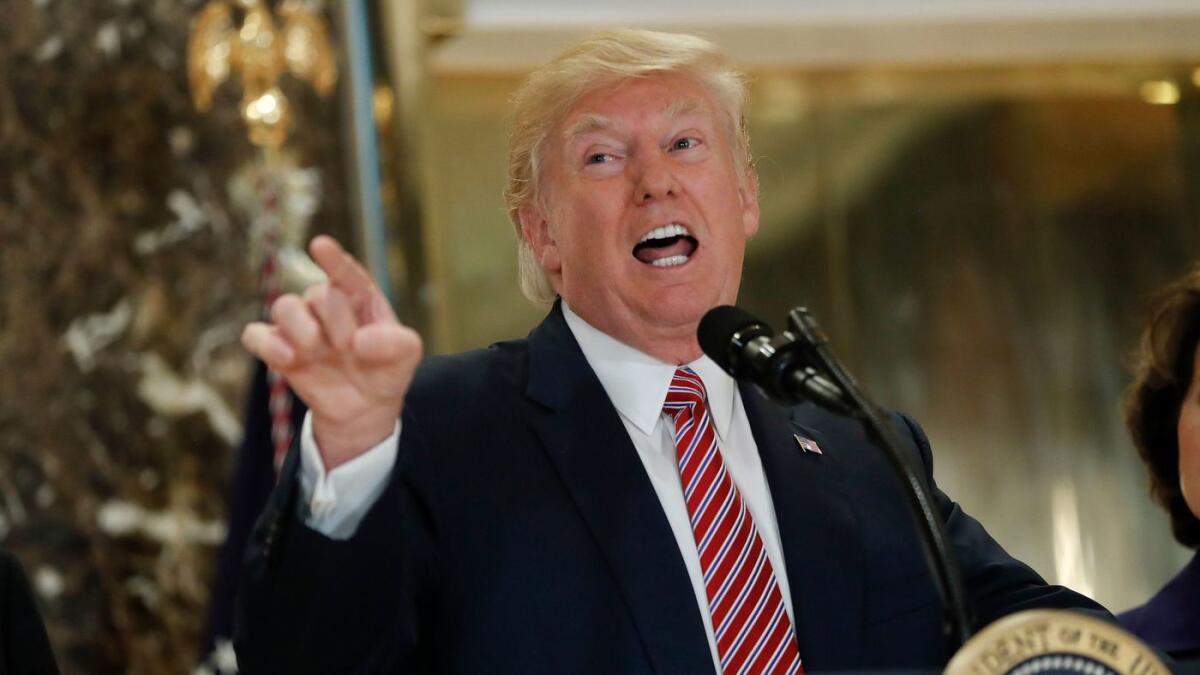
When President Trump decreed that all asylum seekers must present themselves at a port of entry to have their application considered, he broke clear language in U.S. law that says people may present themselves anywhere along the border and request asylum.
Trump predictably got sued, and predictably tried to enforce that rule while the court cases proceed. And just as predictably, the courts told him no. And predictably again, rather than go through the regular appeals process, the president ran straight to the Supreme Court, which shot him down Friday without comment — though by a narrowly divided 5-4 vote.
Meanwhile, President Shutdown is on the verge of furloughing a large portion of the federal government because Democrats in the Senate (wisely) refuse to vote for an omnibus spending bill that would include $5 billion to extend the wall and fencing along the U.S.-Mexico border.
In both cases, the president would have us believe that people entering the U.S. without permission is a crisis — and some do believe him.
But it’s not a crisis. It is a problem with remedies that are within the U.S. government’s power to use, but it refuses to. For instance, it could vastly expand the capacity of the immigration system to process asylum requests more quickly, and it could release those awaiting decisions to the care of organizations that will help insure they return for meetings and interviews.
In fact, Trump inherited just such a program from President Obama that had a near-perfect success rate in getting participants to show up for appointments and court dates. But then Trump killed it because he gets more headlines and political mileage over ranting about illegal immigration than he does over actually working on solutions.
And no, the wall is not a solution. Just ask a ladder manufacturer. Or a tunnel expert. Or a rafter. Or an agile climber.
Interestingly, illegal immigration is at its lowest level in a decade, according to a report from the Pew Research Center. It estimated there are 10.7 million people living in the U.S. without permission, down from a peak of 12.2 million on 2007. Per Pew:
“The declining overall number of unauthorized immigrants is due mainly to a very large drop in the number of new unauthorized immigrants, especially Mexicans, coming into the country. Consequently, today’s unauthorized immigrant population includes a smaller share of recent arrivals, especially from Mexico, than a decade earlier. Increasingly unauthorized immigrants are likely to be long-term U.S. residents: Two-thirds of adult unauthorized immigrants have lived in the country for more than 10 years.”
And other reports note that people added to the ranks of the undocumented increasingly are folks who arrived with permission but then didn’t leave. Better tracking by the government of visa-holders would go a long way toward resolving that, while a wall would do absolutely nothing.
Which the American public recognizes — nearly-two thirds oppose shutting down part of the government over wall funding.
At some point Republicans are going to have to take a stand against the president’s unhealthy fixation on illegal immigration and work across the aisle with Democrats to reform the immigration system and laws, from visa categories to limited amnesty to border enforcement.
In fact, congressional Republicans could work with the Democrats to pass a veto-proof bill to fund the government, and actually lead the country. But that would require putting country ahead of party, a test they have failed time and again.
- Share via
New (and maybe ominous) developments in the Mueller Massacre Watch
Since virtually the day he was appointed (May 17, 2017), special counsel Robert S. Mueller III has been investigating on what many fear is borrowed time. The concern that President Trump would enact his own version of Richard Nixon’s Saturday Night Massacre by firing Mueller is constantly fed by Trump’s unhinged tweets about a “witch hunt.”
And don’t forget that, according to the New York Times, Trump actually asked then-White House Counsel Don McGahn to dismiss Mueller soon after Mueller was named to investigate possible collusion between Trump’s 2016 campaign and Russia.
But Mueller is still here, and he has notched an impressive series of indictments and guilty pleas. But the Mueller Massacre Watch is on alert today because of two new developments.
First, as my colleague Del Quentin Wilber reports, Justice Department officials are saying that Acting Atty. Gen. Matthew Whitaker will not recuse himself from supervising Mueller’s investigation. (Those officials also revealed that Whitaker until now hasn’t been briefed on the probe.)
Before joining the administration, Whitaker criticized the Mueller investigation, which some see as an ominous sign that he will undermine it once he replaces Deputy Atty. Gen. Rod Rosenstein as the senior Justice Department official on the case. In an editorial in November, the Los Angeles Times wrote that it was “hard to imagine a less reassuring replacement” for Jeff Sessions than Whitaker.
Since then, Trump has said he will nominate former Atty. Gen. William Barr as Sessions’ successor. But that takes us to this week’s second revelation, that Barr last June sent an apparently unsolicited memo to Rosenstein and Assistant Atty. Gen. Steve Engel assailing the idea that Trump could be questioned about possible obstruction of justice connected to his firing of former FBI Director James B. Comey.
Essentially, Barr’s memo is a lengthier version of the argument Harvard law professor Alan Dershowitz has made on television: that the president can’t obstruct justice by exercising his constitutional authority to hire and fire appointees such as Comey.
Barr does concede that a president could obstruct justice if he “knowingly destroys or alters evidence, suborns perjury or induces a witness to change testimony.” But his analysis would block what is widely considered to be one of Mueller’s main avenues of investigation.
Rep. Adam B. Schiff tweeted this warning today: “Absent an iron-clad commitment to recuse himself from the Russia probe and obstruction of justice issue, this memo should disqualify Barr from consideration.” Schiff isn’t a member of the Senate, which will consider Barr’s nomination, but his fellow California Democrat Dianne Feinstein is. In fact, she’s the top Democrat on the Senate Judiciary Committee, which will conduct confirmation hearings.
This is what Feinstein said today: “Mr. Barr’s memo to Deputy Atty. Gen. Rod Rosenstein, which we received late last night, is very troubling. The drafting of this memo was not undertaken lightly. The memo presents a thoroughly crafted legal argument against investigating the president, with pointed conclusions that the president is above the law. The president is not above the law.”
Feinstein added: “There’s no reason for a lawyer in private practice to do this unless he was attempting to curry favor with President Trump and convey that he would protect the president.”
If even a few Republican senators have similar concerns, Barr might have to promise to recuse himself from the Russia investigation to win confirmation, which would leave the investigation under Rosenstein’s oversight. That would be the best outcome anyway.
Speaking of Rosenstein, he tried to calm matters Thursday by expressing confidence in Barr and promising that the Russia investigation would he “handled appropriately by the Department of Justice.”
Even so, the Mueller Massacre Watch continues — and for good reasons.
- Share via
Trump revives his threat to shut down part of the government
Having proudly claimed responsibility for any government shutdown that should occur this month, President Trump now seems determined to force one. That’s some Christmas gift to more than 300,000 federal workers who may be temporarily furloughed (or forced to work without a timely paycheck, if their jobs are deemed “essential”).
According to House Speaker Paul D. Ryan (R-Wis.), Trump informed top House Republicans on Thursday that he would not sign the short-term funding bill that the Senate passed Wednesday. That’s because the measure does not include the $5 billion Trump has sought for building a higher, more extensive wall along the southern border.
Funny, but the White House announced Tuesday that Trump did not want to shut down the government and would instead find other ways to fund the wall. Evidently, the blowback from far-right members of Congress and the pundit class persuaded Trump to make his stand on the end-of-year spending measure after all.
At least, that’s what it looks like at the moment. Plans change rapidly in the Trump White House, which is nothing if not flexible.
There’s a civics lesson here. Under the Constitution, Congress has exclusive control over the federal purse. The power to tax and spend rests in the legislative branch alone, and you know, it’s pretty good at it! As long as it doesn’t have to balance those two things.
Yet when Congress is divided, the president’s veto power gives him more than a little say over the appropriations process. As long as he has enough support in one of the chambers to sustain the veto (an override requires a two-thirds majority in each chamber), he can kill a bill that doesn’t fund a project he favors, or that requires him to spend on something he doesn’t want to support.
Over the years, I’ve seen any number of spending bills vetoed for those reasons. What makes the current fight different is that so much of the government’s funding has been piled into a single continuing resolution. The combination makes the stakes considerably higher and gives the president more leverage.
So why is so much riding on one piece of legislation that Trump is threatening to veto? Because Congress failed to pass by Oct. 1 (the start of the fiscal year) about half of the appropriations bills that provide annual funding for the various federal agencies. The seven remaining bills have been joined into one that covers about a third of the federal workforce, including the departments of Homeland Security, State, Housing and Urban Development, Transportation, Agriculture, Treasury and Interior. Wall funding is an issue just for the DHS bill, but because that measure has been lumped in with half a dozen others, the consequences of a shutdown would be that much greater.
Sad to say, it’s a sign of considerable progress that Congress managed to get five of the 12 annual spending bills done by Oct. 1. But if lawmakers really want to wield the full power of the purse, they need to get the appropriations process back on track and stop making huge chunks of the government vulnerable to year-end hostage-taking.
- Share via
Entrapment? Nope. Michael Flynn says he knew that lying to the FBI was a crime
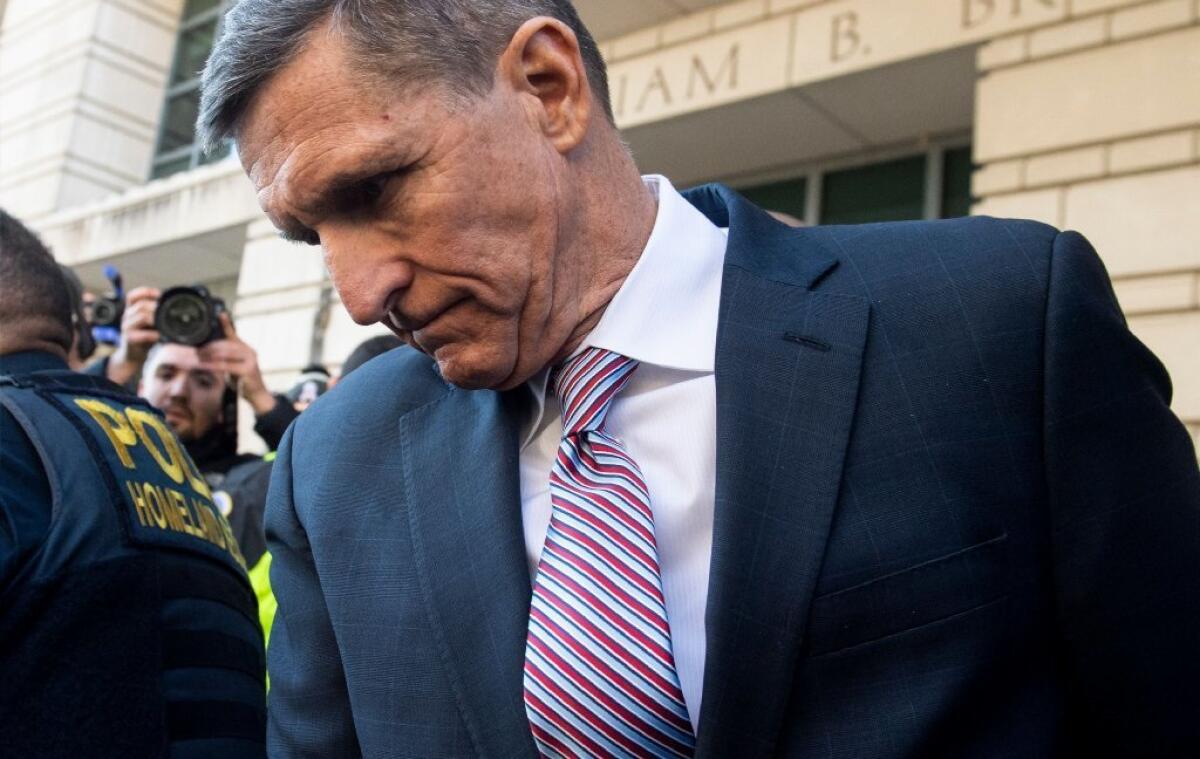
U.S. District Judge Emmet G. Sullivan performed a public service Tuesday when he got former national security advisor Michael Flynn to acknowledge that he knew he was committing a crime when he lied to the FBI about his conversations with Russia’s ambassador during the presidential transition.
In recent days, Flynn’s lawyers and some conservative commentators have pushed the idea that the FBI had taken advantage of Flynn by not warning him in advance that lying to agents would be a crime. The Wall Street Journal published an editorial with the over-the-top title “The Flynn Entrapment.”
Sullivan took a lot of air out of that theory at Tuesday’s sentencing hearing for the retired general.
“Were you not aware that lying to FBI investigators was a crime?” the judge asked Flynn.
“I was aware,” Flynn replied.
Given the fact that Flynn pleaded guilty to lying, the suggestion that he was treated unfairly seemed puzzling, though some speculated that it was a bid for a pardon from his former boss. President Trump has expressed sympathy for Flynn, tweeting “Good luck” before the hearing. By contrast, the president has called his former lawyer Michael Cohen, who also has pleaded guilty to federal charges, a “rat.”
Whatever the motivation for alleging that Flynn was treated unfairly, the strategy seems to have backfired.
Although special counsel Robert S. Mueller III has recommended that Flynn not receive any prison time, Sullivan said he was “not making any promises” on that point. He postponed Flynn’s sentencing until after two of Flynn’s former business associates, who were charged with illegally working on Turkey’s behalf, go on trial. Flynn has agreed to cooperate with prosecutors in the case.
Sullivan deserves praise for debunking the notion that Flynn was entrapped, though his caustic criticism of the defendant was sometimes over the top. In language reminiscent of British judges, who are known for their scolding of defendants, Sullivan said: “I’m not hiding my disgust, my disdain for this criminal offense.” The problem with getting carried away by your indignation is that you sometimes make mistakes.
Referring to Flynn’s work for Turkey, the judge told Flynn: “All along you were an unregistered agent of a foreign country while serving as the national security advisor.” But, as the judge later admitted, Flynn’s work for Turkey had ended in mid-November of 2016, before the start of the Trump administration. Sullivan also had to walk back a suggestion he made that Flynn might have committed treason.
But Sullivan was absolutely correct on the main point, which he stated in careful language: “This is a very serious offense — a high-ranking senior official of the government, making false statements to the Federal Bureau of Investigation while on the physical premises of the White House.” Flynn is not a victim.
- Share via
The West is being won — by women

Who knew that Arizona Gov. Doug Ducey was a feminist?
For today, at least, he is. By appointing outgoing Republican Rep. Martha McSally to the U.S. Senate to replace retiring Republican Jon Kyl (who had been appointed in September to fill the seat vacated when John McCain died), Ducey has increased the female representation from Arizona in the Senate by 100%.
Good for him! McSally’s appointment also means that in a few short weeks, she will join Democrat Kyrsten Sinema in the Senate (which might be a tad uncomfortable, given that Sinema beat McSally on Nov. 6 after a brutal campaign for the seat held by retiring Republican Sen. Jeff Flake).
It’s quite remarkable for a state for that never had a women serve in that position, let alone two at same time.
You know what else is remarkable? As of January, both Senate seats in four Western states will be held by women. In Nevada, Sen. Catherine Cortez Masto, a Democrat, will be joined by fellow Democrat Jacky Rosen, who knocked off Republican Sen. Dean Heller last month (electorally speaking). The new all-female Senate teams in Nevada and Arizona will join those from Washington state, which has been represented by women senators (Maria Cantrell and Patty Murray) since 2001, and California, which has had only female senators (currently Dianne Feinstein and Kamala Harris) since 1993.
Trip on that for a minute. Four Western states.
Of California’s immediate neighbors, only Oregon is the odd (wo)man out with two male senators, though unlike other states it has had a woman in that position before. But Oregon does have a woman serving as governor (Kate “the other Gov.” Brown), so the state gets points for female leadership.
Does this mean I’m saying McSally is a great appointment? No comment. I didn’t follow the race closely, though she was a bit Trumpy for my taste during the campaign and, according to the Washington Post, had to apologize to Cindy McCain for slighting her late husband.
But heaven knows the Senate’s Republican caucus desperately need more women in its ranks. Remember when the Senate GOP couldn’t find even one woman to serve on the committee of 13 men working on a plan to undermine, er, overhaul the Affordable Care Act?
- Share via
Where should the Trump Foundation’s money go? I have a few thoughts
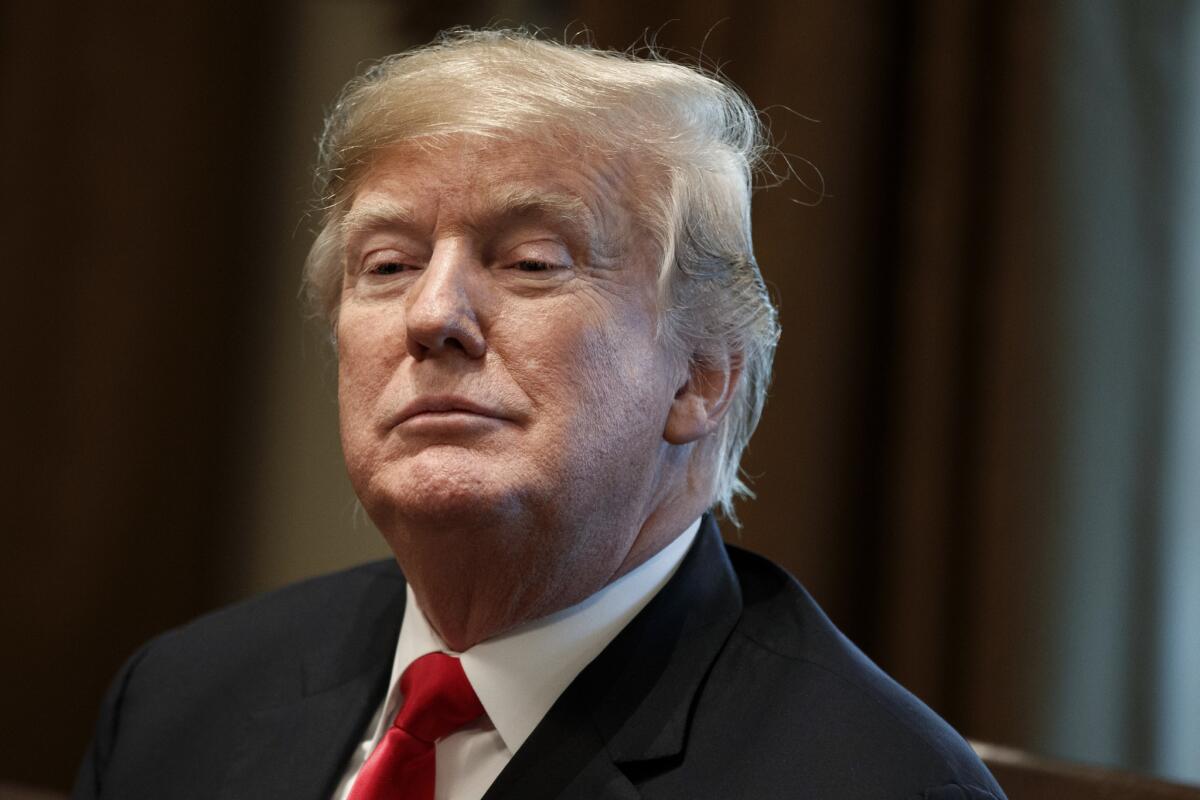
New York Atty. Gen. Barbara D. Underwood announced Tuesday that President Trump and his family had agreed to dissolve his charitable foundation, which the state alleges served as a piggy bank for Trump’s personal and campaign needs.
Naturally, this prompted a slate of stories rehashing the juiciest allegations in the state’s lawsuit, which will move forward. A personal favorite: The foundation gave $7 to the Boy Scouts of America in 1989, which the Washington Post’s David Fahrenthold observed “matched the amount required to enroll a boy in the Scouts the year that [Trump’s] son Donald Trump Jr. was 11.”
Underwood summarized the allegations this way: “Our petition detailed a shocking pattern of illegality involving the Trump Foundation – including unlawful coordination with the Trump presidential campaign, repeated and willful self-dealing, and much more.” Ouch.
It’s worth noting, though, that Trump tried to shutter the foundation after the election, only to be held off by the attorney general. So in one respect, Tuesday’s agreement simply gives Trump what he’s been seeking for months.
Naturally, there is an important twist. The foundation will have 30 days to submit a list of nonprofits that will collect the remaining balance — $1.75 million, much of it contributed by folks outside the Trump family — jointly with Underwood’s office, with the attorney general having veto power. So, no more contributions to support the re-election of Republican officials while they are investigating Trump businesses.
But where should the money go? Here are a few suggestions of groups that find themselves particularly in need at the moment:
* Groups responding to the humanitarian crisis on our southern border, such as Catholic Charities of the Rio Grande Valley, the Refugee and Immigrant Center for Education and Legal Services and Kids in Need of Defense.
* And while we’re at it, groups that support and sustain displaced people, such as the International Rescue Committee and Doctors Without Borders, now that the U.S. isn’t so eager to take them.
*The Committee to Protect Journalists, in the name of Jamal Khashoggi.
* To offset the administration’s attacks on the Affordable Care Act’s provisions on contraception and preventive care, Planned Parenthood. Admittedly, that one would sting.
* The California Republican Party, because Trump has proved to be incredibly hazardous to GOP candidates’ health in the Golden State. OK, the party isn’t really a charity. But it could really use the help.
- Share via
The U.S. is now jailing 15,000 migrant kids in immigration detention centers
The recent death of a 7-year-old Guatemalan girl in Border Patrol custody was tragic, and I hope the inspector general’s investigation into what happened is both comprehensive and fast. Especially since the father of Jakelin Caal Maquin disputes some basic elements of the Border Patrol’s version of events.
But the death also spotlights the broader issue of the U.S. government making prisoners of migrant children in astonishing numbers. As of last week, the government was holding 15,000 minors – mostly teenage boys – in various detention centers around the country.
Let that sink in: The U.S. government is jailing children who, in most cases, arrived at the southwest border seeking asylum. Do they all qualify for sanctuary? Probably not, but we have a system for making such decisions, and at the moment, that system is imprisoning an entire village’s worth of minors.
Part of the problem is so many kids have arrived that the government lacks the capacity for handling the asylum requests. An agile administration would find a way to increase the processing capacity rather than incarcerating the children.
We don’t have one of those. The problem first surfaced with a surge of unaccompanied minors during the Obama administration, which also flailed about trying to find a solution. But it has now has been exacerbated by another Trump administration policy to conduct deeper background checks into people who volunteer to serve as guardians so the children can be released while their applications are considered. The government said it needed tougher checks to protect the minors, but that was clearly a pretext.
In fact, from July through late November the government arrested 170 would-be guardians because they, too, lacked legal permission to be in the country.
That, to no one’s surprise, has had a chilling effect on sponsors volunteering to take the children in. So much so that, NPR reports, children are being held an average of 50 days, even though the 1997 Flores court settlement says they must be released to a caregiver (usually a relative or family friend) “without unnecessary delay,” defined as with 20 days.
So Trump’s strategy for dealing with migrant children isn’t deterring others from arriving, protecting national security or acting in the best interests of the children it is taking responsibility for by incarcerating them. And it may be violating the 1997 Flores agreement.
So why exactly is the administration sticking with this appalling approach?
- Share via
Ryan Zinke was a nightmare for the environment. His replacement might be worse
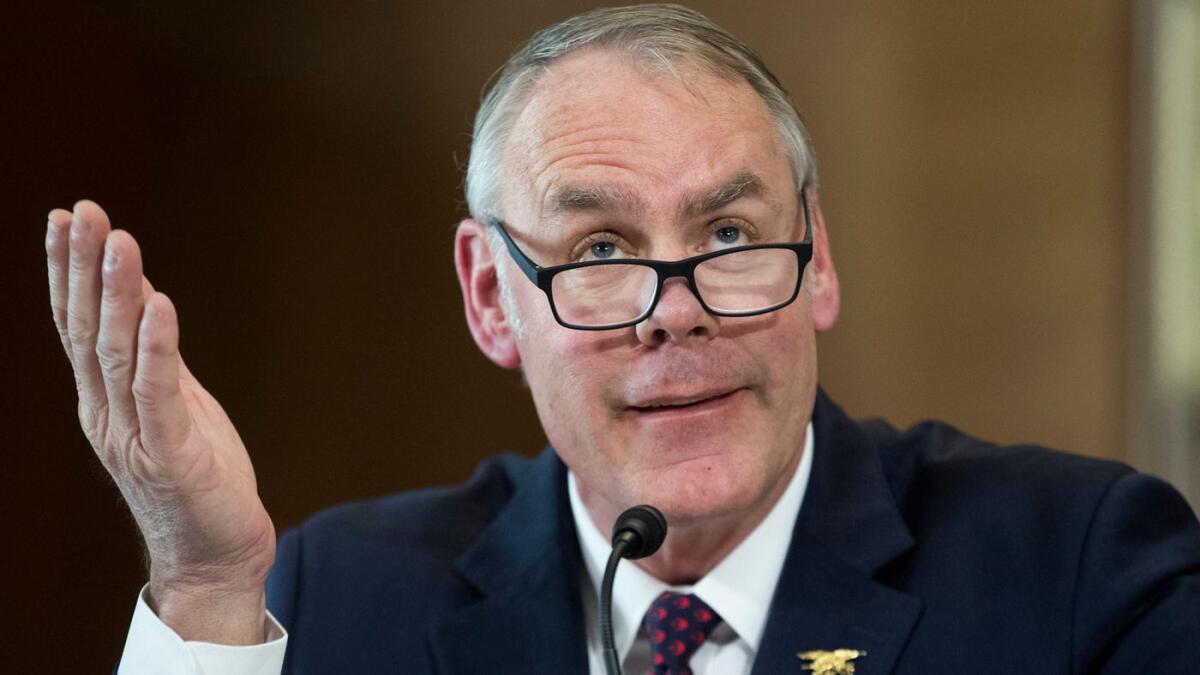
The announced departure of Ryan Zinke as Interior secretary was both expected and overdue – even in this scandal-plagued administration, Zinke stood out as the object of at least 17 investigations (several of which closed without finding fault), and whose involvement in a real estate project in his hometown of Whitefish, Mont., has been referred to federal prosecutors. And with Democrats taking over the House next month, Zinke was sure to face some serious grilling time in committee hearings.
Then there are Zinke’s atrocious environmental policies, in which he has happily done President Trump’s bidding in trying to open as much federal land to oil and gas drilling and other extractive industries as quickly as the administration can. He also led the charge in shrinking the Grand Staircase-Escalante National Monument and Bears Ears National Monument in Utah, among others — actions that environmental groups have challenged in court.
So good riddance, for the sake of both ethics and the environment.
But, much like the fall of Scott Pruitt over at the Environmental Protection Agency, Zinke’s departure isn’t all good news.
Zinke’s likely successor is his deputy, David Bernhardt, a longtime oil, gas and water lobbyist who knows his way around regulatory bureaucracies in ways Zinke doesn’t. Where Zinke’s rash moves to make sudden changes left those decisions vulnerable to court challenges, Barnhardt knows how to handle the technical end of the regulatory process.
In many ways, he probably poses a bigger risk to environmental protections than did Zinke. And that’s saying a lot.
Similarly, when the scandal-plagued Pruitt wore out his welcome — really, how bad must you be to cross a line that even Trump finds too hard to defend? — he was replaced by his deputy, former industry lobbyist Andrew Wheeler, who has kept a much lower profile than his predecessor while methodically trying to dismantle regulations that, in some cases, stretch back decades.
This is where the Trump administration is doing significant damage. While the country focuses on Trump’s furtive journey through a legal minefield, and on his lies, tweets and blustery outbursts, the remaining members of his administration are trying to methodically destroy governmental oversight of the environment.
Environmental groups have lined up to challenge many of the changes in court, but damage is still being done, whether it’s Trump’s dismissal of climate science, policies favoring fossil fuels, or the recent rollbacks of federal water protections (done, Wheeler announced, in service of states’ rights).
Those legal challenges are good, but voters also need to get vocal about the damage this administration is causing to the environment and to national treasures set aside for the public benefit, not reserved for the oil, gas and mining industries.
- Share via
Another accomplished Republican woman defects from the party of grumpy white men
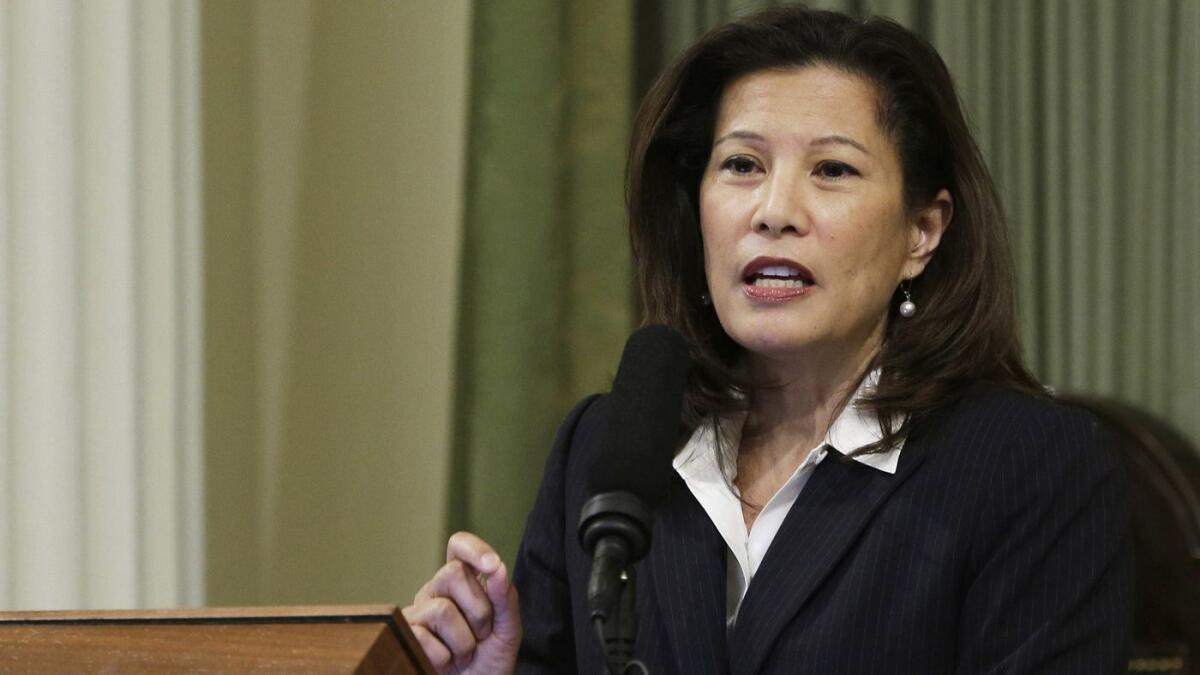
The Republican Party can count another notable defection this week: California Chief Justice Tani Cantil-Sakauye, who told reporters this week that she decided to dump her affiliation with the GOP after the Brett M. Kavanaugh Supreme Court hearings. She reregistered as having no party preference.
This was news to me in part because I didn’t realize Cantil-Sakauye was a Republican, though I knew she had been appointed by one, former Gov. Arnold Schwarzenegger. In fact, I never gave much thought about her political affiliation, which is exactly what you want in a chief justice.
I can’t believe the Republican Party wants to chase away smart people, especially women. But as long as the party’s leadership continues to cover for the toxic president, more are likely to leave. (If this were a novel, it would soon be revealed that the Trump presidency was an elaborate plot cooked up by foreign agents in order to destroy the Republican Party from within.)
“Instead of going forward, we’re going backward,” outgoing Republican Rep. Ileana Ros-Lehtinen of Florida said of her party in an interview with NPR on Friday, noting that she was not a “Trump Republican.”
“We need to pay attention to the changing demographics of our country,” she warned her party. “We have not been attuned to that. We have been appealing to one certain section of America.”
Namely, grumpy white men, which is not exactly a strategy for success in the demographically changing U.S.
- Share via
Will the death of a 7-year-old girl at the border finally bring some oversight to our immigration gulag?

The death last week of a 7-year-old Guatemalan girl hours after Border Patrol agents took her and her father into custody is a tragic turn of events that engenders no small amount of finger-pointing and recriminations. Someone must be to blame, but who?
White House spokesman Hogan Gridley told reporters Friday morning that the death was “a horrific, tragic situation. Obviously, our hearts go out to the family and to anyone who’s suffered any type of danger and peril that they see so often when they make that trek up from the southern border.”
He then turned political: “It’s a needless death and it’s 100% preventable. If we could just come together and pass some common sense laws to disincentivize people from coming up from the border and encourage them to do it the right way, the legal way, then those types of deaths, those types of assaults, those types of rapes, the child smuggling, the human trafficking that would all come to an end. And we hope Democrats join the president.”
That’s one hyperbolic and reality-challenged way of framing it, and was clearly the talking point of the day for the administration — Homeland Security Secretary Kirstjen Nielsen said pretty much the same thing earlier on “Fox and Friends.”
The girl died in U.S. custody of dehydration and vomiting, and reportedly didn’t receive medical treatment until 90 minutes after her father told agents that the girl was throwing up. When asked if the U.S. bore any responsibility for her death, Gridley responded, “Does the administration take responsibility for a parent taking a child on a trek through Mexico to get to this country? No.”
Yet the government does bear responsibility for the health and welfare of people it takes into custody — especially children. And in most cases, it chooses to incarcerate the migrants (federal law requires only that people with specific criminal convictions be detained during deportation proceedings).
It’s unconscionable that the government incarcerates children in the first place. And it’s unconscionable that the government didn’t announce the girl’s death for a week. It didn’t see fit to inform Congress even though Customs and Border Protection Commissioner Kevin McAleenan testified before the Senate Judiciary Committee about his agents’ role in tear-gassing migrants at Tijuana as he discussed the “border security and humanitarian crisis” along the Southwest border.
Did McAleenan not know of the girl’s death in the custody of his agency? Or did he not see that as a sufficient tragedy to be considered part of the humanitarian crisis?
There have long been complaints about the federal system for incarcerating migrants, including issues associated with for-profit prisons, contracts with local jails (where migrants, often not even accused of a crime, are housed with local inmates), and the Tornillo tent city near El Paso where 1,600 children (soon to expand to 3,800) are being held as they await release to guardians — and where facility officials failed to conduct proper background checks on their workers.
It’s heartening — at least — to see that the Homeland Security Office of Inspector General has already announced an investigation. If there is to be any silver lining to the tragic death of the girl identified by her government as Jackeline Caal, may it be that our nation’s immigration gulag gets stronger, deeper and more effective scrutiny and congressional oversight, and that this administration is forced to accept responsibility for the misery it has caused among people who, by and large, are guilty of nothing more than seeking safety and a better life.
- Share via
Who does America execute? A lot of people with mental illness and brain traumas
It’s been apparent for years that the American death penalty system is so deeply and irredeemably flawed that it should not be used to determine whether someone should die for a crime. It’s prone to manipulation by prosecutors and police, witnesses get details wrong (intentionally and not), and the penalty is applied disproportionately on minorities and the poor.
But a new report by the Death Penalty Information Center also argues that the death penalty is also disproportionately applied on people with mental illness and brain traumas.
The organization, which released its annual year-end overview early Friday morning, reports that of 25 executions in 2018 — a near-record low for the modern era — at least 11 of the condemned displayed “significant evidence of mental illness.” Further, at least nine showed “evidence of brain injury, developmental brain damage, or an IQ in the intellectually disabled range” and at least 11 had suffered “chronic serious childhood trauma, neglect, and/or abuse.” Many of the executed fell into more than one category.
Of the 25 executed men, six – or about 25% — were age 21 or younger when they committed the crimes for which they were sentenced to death. There is growing consensus among experts that the rational part of the human brain doesn’t fully mature until age 25 or so.
So we’re killing people who were immature at the time of their crimes, or who were mentally ill at the time of their execution (and often at the time of the crime), or who had learning and other cognitive disabilities.
Yes, murder is a horrific crime, resonating far beyond the victim. It is deserving of harsh punishment. But do the mentally ill deserve to be executed for acts they may not have understood? Or whose rational culpability is weighted by cognitive disabilities? And who were at a disadvantage in helping their attorneys defend them?
Death rows are packed with people whose illnesses and disabilities were significant factors in their crimes. The Supreme Court has ruled that the insane and the developmentally disabled are ineligible for the death penalty, but determining the threshold can be subjective. And is someone more culpable if he kills on his 18th birthday than if he committed the crime the night before?
Here in California, Ronnie McPeters, who shot and killed a woman at a Fresno fast-food drive-through in 1984, told a psychiatrist that he was filming a commercial. After his conviction and removal to death row at San Quentin, his mental state deteriorated further to the point where he hoards his own feces, talks to a wife and children who do not exist, and hears imaginary voices of his victim’s relatives.
A federal judge ruled in 2007 that McPeters was too mentally ill to be executed, and the state attorney general’s office has joined with McPeters’ lawyers to ask the state Supreme Court to commute his sentence to life in prison because it would be unconstitutional to kill him.
Yet because of court backlogs, McPeters still sits on death row along with more than two dozen other condemned inmates who, like him, are probably too mentally ill to be executed. One, Justin Helzer, put his own eyes out with a pen trying to drive it into his brain. A third, Oscar Gates, thinks he’s in prison because the state wants to steal his inheritance from Howard Hughes and “that prison medical staff are trying to poison him with radioactive cobalt, or that Howard Hughes told him how to cure AIDS with yellow chili peppers,” according to court documents.
At least here in California federal courts continue to bar executions, and even with the passage of Proposition 66 and a new (and disputed) single-drug lethal injection protocol, it doesn’t seem that executions will resume soon — if for no other reason than that state will have trouble obtaining the execution drugs even if the courts allow it fire back up “the machinery of death,” as Supreme Court Justice Harry Blackmun so eloquently phrased it.
Capital punishment is an immoral practice that the nation has proved time and again that it can’t get right, from exonerations (four from California’s death row) to botched executions, and at its heart is little more than official vengeance. It needs to end.
- Share via
White House Chief of Staff Newt Gingrich would be a beautiful disaster

Some things are just too good to be true, yet it’s hard to resist believing them. That story about Miley Cyrus telling fans to worship Satan if they wanted to be rich and famous like her? Ummm, no. Or the new PlayStation 4 for $89 on Black Friday? Sorry.
This next news tidbit probably falls into that category:
This would be a Washington reporter’s dream. Gingrich can’t help himself — he is a chaos machine. Yes, so is the man who might employ him; both seem to jump from one idea to the next, regardless of how big a gap there might be between the two concepts. But Gingrich is cerebral, and President Trump is … not.
More important, the president’s chief of staff is the guy who’s supposed to bring order and discipline to the presidency. The chief is not just the gatekeeper to the Oval Office; he or she is the enforcer who keeps the president focused and moving forward toward the administration’s objectives.
That’s not Gingrich’s forte, not by a long shot. He’s an astute politician, having engineered the Republicans’ ascension from a quasi-permanent minority in the House to a seemingly dominant majority. But as Republicans would freely admit, he wasn’t anything close to disciplined as a speaker. And as a result, he would be an unmitigated disaster as a chief of staff.
Here’s a telling quote from former Rep. Scott Klug (R-Wis.), in an interview with the Wall Street Journal in 2011 about then-presidential candidate Gingrich: “Newt has 10 ideas a day — two of them are good, six are weird and two very weird.”
Gingrich is not just an outside-the-box thinker; he’s an outside-the-building-where-the-box-was-delivered thinker. That makes him receptive to new ideas, which is a good thing, but also prone to an ever-expanding agenda, which isn’t helpful at the top of the White House bureaucracy.
Klug added that he wasn’t sure how Gingrich could make it through the campaign (Gingrich actually lasted until early May, longer than most of the contenders). “It’s very hard for him to remain focused. That will be a real challenge for him.”
That’s also one of the main reasons a Gingrich appointment, as profoundly bad an idea as it might be, would be a treat for the White House press corps. Granted, he is no more a fan of journalists than Trump is. But reporters could count on him saying something headline-worthy just about every day — sort of like Rudy Giuliani, only with a more historical references.
And that’s why Trump won’t pick Gingrich, or if he did, why Gingrich’s tenure would rival Anthony Scaramucci’s for brevity. The president wants to be the story, and rightfully so; he doesn’t want to have to compete with his chief of staff for the media’s attention.
So as much of a Christmas gift as it would be for some of us if Gingrich took John F. Kelly’s place as the West Wing bouncer, it’s not going to happen. I think I’ll keep asking Santa for a pony instead.
- Share via
President Trump, hostage taker?

When Canadian authorities arrested Huawei Technologies executive Meng Wanzhou last week at the request of the U.S. government, questions immediately surfaced over whether the American arrest warrant was an independent act of the Justice Department seeking to enforce sanctions against Iran, as it claimed, or whether Meng was just a bargaining chip in Trump’s trade battles with China, as Beijing officials claimed.
The president seemed to erase any doubt earlier this week when he told Reuters that he “would certainly intervene if I thought it was necessary,” which converted Meng from a suspected felon into an apparent hostage.
That’s dangerous ground, as the world learned with news that China has detained two Canadian citizens on unspecified national security charges, a clear response to Meng’s arrest. One, Michael Kovrig, is a former Canadian diplomat on leave from his government job as he works as a respected international analyst for the International Crisis Group; the other, Michael Spavor, runs cultural exchange programs with North Korea.
Trump’s statement that he may intervene in the case against Meng could be one of his most dangerous “break the norms” moments since he won the White House. By putting her arrest in play as a bargaining chip in trade talks, Trump has told the world that hostage-taking is now a part of his approach to international negotiations too.
It also is a further erosion of the independence of the Justice Department. Trump has already demanded that it investigate his political foes, including Hillary Clinton, though so far the department has refused to follow his lead. It’s unclear how much it could resist him in the Meng case, but to swap her prosecution for a trade deal tells the world that U.S. arrest warrants can be made to go away if Trump gets a trade concession.
While Trump may have the legal authority to intervene in a specific case, that he is willing to do so not for reasons of justice, but for political gain, is an appalling blurring of policy goals and our concept of an independent and professional Justice Department.
And it puts international business leaders at incredible risk. If I was an American business executive in China right now, I’d be looking at flights home.
- Share via
New Yorkers may love Letitia James for going after Trump. But politicized justice can be dangerous
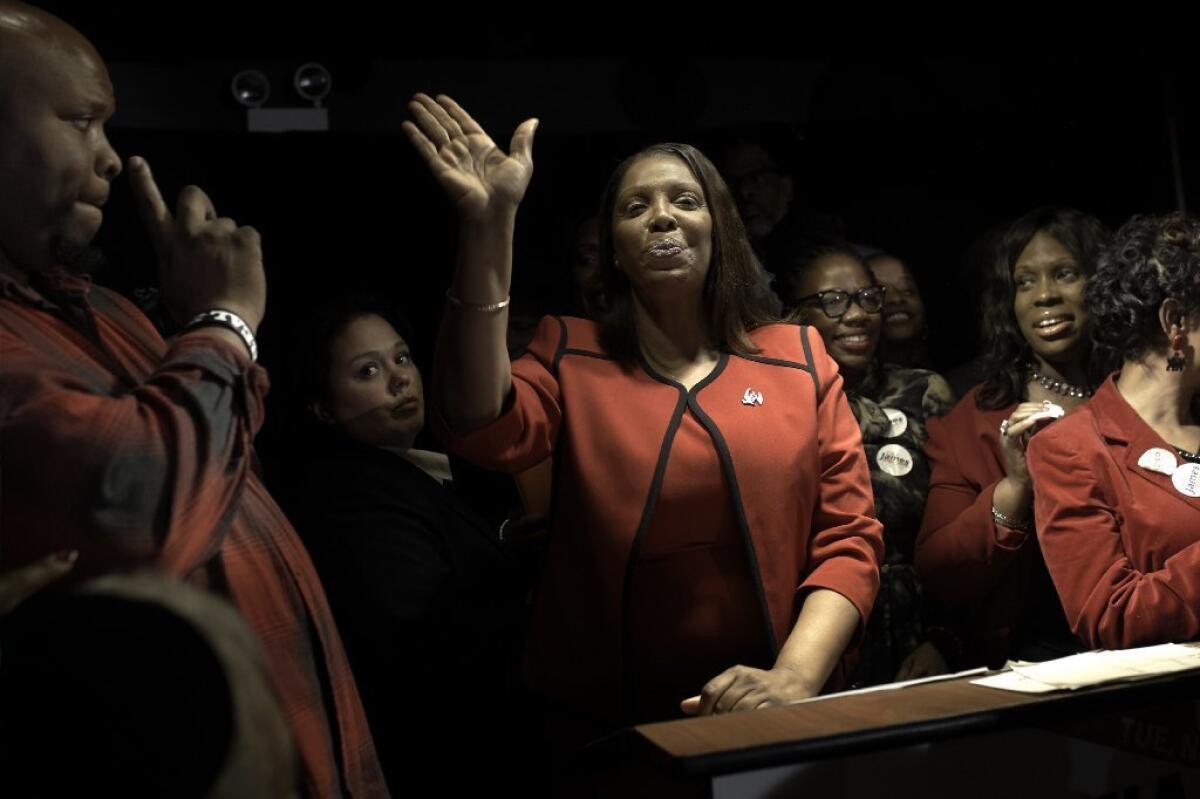
New York state’s incoming attorney general has put a target on President Trump’s back.
“We will use every area of the law to investigate President Trump and his business transactions and that of his family as well,” Democratic Atty. Gen.-elect Letitia James told NBC News in an eyebrow-raising interview published Wednesday.
James mentioned several specific areas of potential investigation, including Trump’s real estate holdings in New York; the Trump Foundation; and the now-famous 2016 Trump Tower meeting involving Donald Trump Jr., Paul Manafort, Jared Kushner and a Russian lawyer said to have incriminating information about Hillary Clinton.
“We want to investigate anyone in his orbit who has, in fact, violated the law,” James said.
James’ comments were denounced by Ari Fleischer, who served as George W. Bush’s press secretary. Fleischer tweeted:
But not all the criticism of James’ comments was partisan. Witness this tweet by Brendan Nyhan, a public policy professor at the University of Michigan:
Trump rightly has been criticized for suggesting that the Department of Justice should prosecute “Crooked Hillary Clinton.” James’ comments in the NBC interview make it easy for critics to accuse her too of wanting to politicize justice.
The problem is that some might say she has a mandate from the voters to do exactly that.
As James explains in the NBC interview, she campaigned in support of legislation to change New York’s double-jeopardy laws to allow state prosecution of individuals who receive a presidential pardon. Granted, that position can be defended as a general policy position, but it seems to have been inspired by Trump.
And in endorsing James over her Republican opponent, the New York Times editorial page expressed confidence that, if Trump fired special counsel Robert S. Mueller III or pardoned associates who might testify against him, James “would pursue the proper state action.”
Finally, in her victory speech James told supporters that Trump “should know that we here in New York — and I, in particular — we are not scared of you. And as the next attorney general of his home state, I will be shining a bright light into every dark corner of his real estate dealings, and every dealing, demanding truthfulness at every turn.”
The larger problem may be not James’ words but the fact that she attained her office through a partisan election.
When attorneys general are elected, voters can be excused for believing that the office is political — and not just in the sense that Democrats and Republicans have different priorities for the position. (Democratic attorneys general tend to focus on civil rights and consumer protection; Republicans are more likely to portray themselves as tough on street crime.)
In this case, New Yorkers could reasonably have believed that a vote for James was a vote to make life difficult for Trump. Isn’t that what elected Democrats are expected to do regardless of what office they hold? Which is a good argument (but not the only one) for filling this position through appointment, not election.
- Share via
P.C. culture isn’t killing the Oscars. Hosting the awards is a thankless gig
How can it be that no one (besides Whoopi Goldberg) wants to host the Oscars?
Are other comics worried that internet users will unearth some cyber trove of homophobic, sexist or racist remarks and stand-up routines in their pasts? Just days after the announcement that Kevin Hart would host, the comic bowed out when years-old homophobic tweets and footage of his onstage ruminations on why he hoped his son wouldn’t be gay resurfaced on social media. (As he stepped down, he apologized on Twitter for “my insensitive words from my past.”)
Is that why we’re in danger of having the new hashtag #OscarsSoHostless?
You would think it’s not unreasonable to set the bar for hosting at not being homophobic, racist or sexist. Can no one clear that bar? I didn’t even mention tasteless. That would be allowable. Not that the Academy of Motion Picture Arts and Sciences would dare to hire that woman with the whiny voice who emceed the White House Correspondents’ Dinner last spring and almost made Sarah Huckabee Sanders cry. (Now that would get the evening off to a fun start, watching her eviscerate every A-list star sitting in the audience.)
The academy’s board of governors is even considering just having a group of celebrities host the event. Really? Have they erased from their memory banks the grisly Anne Hathaway-James Franco hosting duet of 2011 that was so savagely panned, it arguably set back their careers a couple of years?
The reason no one wants the job is that it’s a thankless task — damned if you’re funny and irreverent, damned if you’re not. You irritate the celebrities in the audience if you go after them; you irritate the viewers at home if you don’t. It’s a ton of work, and as two-time host Jimmy Kimmel groused, he got paid only $15,000. (Not that he needs the money. Plus, there’s an army of veteran joke-writers working on the show constantly.) Meanwhile, you’re hosting a show that is, generally, going down in the ratings — so you’ll be blamed either for its further decline or for not bringing the ratings up more.
But look, it’s not like the show is in danger of being canceled. A huge number of people tune in, all fantasizing about their own imaginary Oscar acceptance speech. (Oh, wait — is that just me?) So the Academy shouldn’t punt on picking a host by letting a bunch of actors pretend that all you need to host the show is a really good dress or tux.
So how do you fill an opening that’s just about as coveted as the one for White House chief of staff? Maybe by thinking outside Hollywood. Why not offer it to John Kelly? (Hey, it couldn’t be any worse than being President Trump’s chief of staff.) Or Nikki Haley. (She killed at the Gridiron in D.C. a few years ago.)
Seriously, what about John Mulaney, the comic, actor and voice of the superhero Spider-Ham in the animated “Spider-Man: Into the Spider-Verse”? Talk show host Jimmy Fallon suggested as much when Mulaney was on his show this week. Mulaney is funny, charming and a hit on college campuses — proof that whiny comedians complaining about college campuses being too sensitive and politically correct are just relying on stock politically incorrect humor.
Or let Whoopi do it if she wants to!
One last note to the academy: Whatever you do, do not pick Cardi B. The Oscars doesn’t need any shoe-throwing.
- Share via
Trump just owned the looming government shutdown

When Washington braces for a potential government shutdown, the usual ritual is that Republicans and Democrats will posture over who will get blamed.
President Trump, however, made it clear Tuesday morning that he will be the one shutting down the government if Congress doesn’t provide money for the bigger, more expansive wall he has promised to build along the southern U.S. border.
Meeting with the top House and Senate Democrats, Trump engaged in a surprisingly public airing of differences over the last remaining appropriations bills. Funding for about half of the federal government will run out Dec. 21 unless Congress acts to extend it, but it appears that lawmakers and Trump are at an impasse — he wants $5 billion to help fund his project, but he may not have enough votes for the wall funding in either chamber.
This isn’t because lawmakers think border security is strong enough already. It’s because many of them don’t think a bigger wall is the right way to shore up the southern border.
Anyway, Senate Minority Leader Charles E. Schumer (D-N.Y.) and House Minority Leader (and soon to be Speaker) Nancy Pelosi (D-San Francisco) took pains while the media were present to pin the blame for any shutdown on Trump. In fact, they called it the “Trump shutdown.”
Trump initially sought to blame Senate Democrats for the holdup, but Pelosi argued that Trump doesn’t have enough support from House Republicans to get the wall funded. (The House Appropriations Committee included $5 billion for the wall in its version of the fiscal 2019 spending bill for the Department of Homeland Security, but GOP leaders never brought the bill to the House floor, suggesting they don’t have enough Republican votes to pass it.) So eventually Trump declared, “You know what I’ll say? ‘Yes, if we don’t get what we want one way or the other, whether it’s through you, through military, through anything you want to call, I will shut down the government.’”
Just to make sure the point was not too fine, he added, “And I am proud to shut down the government for border security, Chuck, because the people of this country don’t want criminals and people that have lots of problems and drugs pouring into our country. So I will take the mantle. I will be the one to shut it down. I’m not going to blame you for it.”
Well, that settles that! Except that it doesn’t. Trump is betting that the public will fear migrants more than it will care about some federal agencies going temporarily dark. So he’s calculating that the blame game won’t matter so much this time.
Here’s how White House Press Secretary Sarah Huckabee Sanders put it:
“President Trump made clear that any government funding measure must include responsible border security, including a wall, to protect the American people from drugs, crime, terrorism, public health threats, and the severe straining of the social safety net. Illegal immigration is deeply unfair to American workers, wage-earners, and taxpayers — costing billions of dollars and thousands of innocent lives.
“So far, the Democrat Party has made clear they would rather keep the border open than the government open. President Trump was grateful for the opportunity to let the press into the meeting so that the American People can see firsthand that while Republicans are fighting to protect our border, Democrats are fighting to protect illegal immigrants. This Administration will always put Americans first.”
Just to be clear here, just about everything Sanders said about what the wall would protect against is not supported by evidence or experience. Just to take one — people in the country illegally aren’t eligible for any of the federal safety net programs, so it’s hard to see how they could be severely straining it. Yes, California has chosen to spend its own tax dollars extending Medi-Cal to some noncitizens, but only to children, whose healthcare costs are relatively low.
Beyond that, a wall doesn’t “protect” anyone against people who overstay their visas, a growing proportion of the undocumented population. In fact, according to the Department of Homeland Security, almost twice as many people came to the U.S. legally and overstayed their visas as crossed the border illegally.
Regardless, Trump’s tactic is typically bold and risky. In previous shutdowns — this year, during President Obama’s second term and President Clinton’s first term — big, important issues were on the table: relief for “Dreamers,” the fate of Obamacare and funding for major federal benefit programs, respectively. And in each case, polls showed that the public objected to the shutdown regardless of the issues at play. People want a functional government. They don’t want agencies held hostage to a policy agenda, especially not one that’s contentious.
- Share via
No, asylum seekers are not exploiting a ‘loophole,’ they’re exercising a legal right
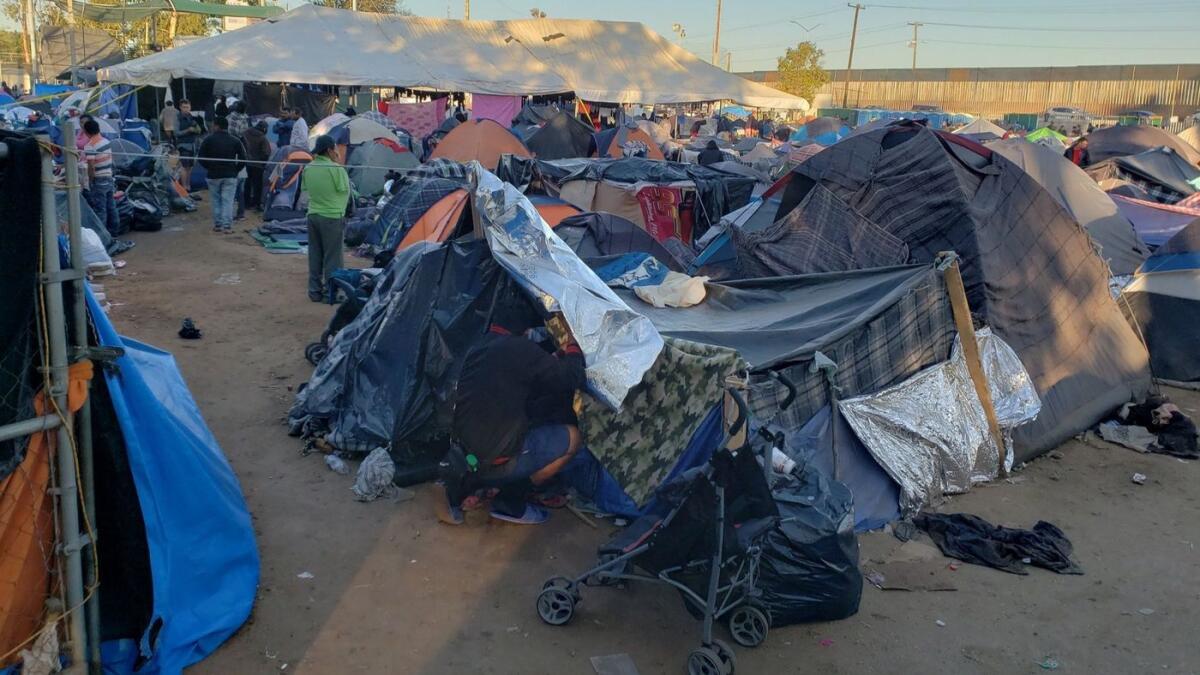
It is only in an administration as dysfunctional and truth-averse as this one that people from other countries exercising their statutorily defined right to seek asylum in the U.S. can be viewed as taking advantage of a “loophole” in immigration laws.
On Monday, the government released statistics showing that the number of people seeking asylum at the border with Mexico has skyrocketed from 55,584 in 2017 to 92,959 in 2018, most of them unaccompanied minors or families with minor children. But asylum seekers still make up only a thin slice of the total number apprehended at the border — 18%, up from 13%.
And two-thirds of asylum-seekers are denied, a percentage that has risen dramatically under Trump policies narrowing the conditions that meet the asylum standard. The vast majority of asylum-seekers are fleeing violence and poverty in Honduras, Guatemala and El Salvador — conditions that have been influenced by U.S. policies, particularly those of the Reagan and first Bush administrations. Whether those were good or bad policies is a topic for another discussion, but the U.S. decision to support anti-leftist actors during insurrections and civil wars added to the violence and destabilization of the region. Those actions helped lay the foundation for other problems too, from corrupt governments to powerful street gangs, some of which came together here in Los Angeles.
People seeking protection from those conditions are the “criminals” and “unknown Middle Easterners” (a whopper, that one) Trump has been railing about as he first sought to fire up his supporters ahead of the November midterms, and now as he tries to squeeze $5 billion out of a Congress whose members — from both parties, mind you — recognize that a massive wall from the Pacific to the Gulf of Mexico will have little effect on illegal immigration or drug smuggling (most of which comes through ports of entry).
Notably, Trump’s wall would have a negligible effect on asylum-seekers, since they by definition are showing up at the border and asking for help. The government would have to deal with those claims no matter how people arrive — on a raft across the Rio Grande, on foot through the Sonoran and Chihuahuan deserts, or simply walking up to the San Ysidro crossing.
On Monday an administration official told reporters that the asylum system is overwhelmed by the number of applicants, which is the administration’s rationale for trying to make them wait their turn in Mexico. While it’s reasonable to give the government some flexibility in managing the intake, given a short-term surge in people seeking to file asylum claims, it is unreasonable and possibly illegal for the government to make people wait in dangerous conditions simply because it doesn’t have enough bureaucrats to do the job.
The immigration system has been underfunded and overwhelmed for years — this isn’t new to Trump. But his draconian ideas on how to handle asylum requests defy past practices and run counter to the intent of Congress when it framed the asylum laws within a broadly accepted international belief that people have a right to seek sanctuary in other countries, and that people should not be returned to places where their lives or liberty are in jeopardy.
But returned they have been. The Washington Post reported recently on a Honduran father who had testified against MS-13 gang members in a Virginia case and feared the gang would kill him if he returned to Honduras. The immigration judge sent him anyway. He was killed.
No one tracks deportees once they’ve left the country, so the U.S. government has no idea how many people whose asylum claims were rejected wound up dead in their home countries. The New Yorker earlier this year carried a report by the director of the Global Migration Project, at Columbia University’s Graduate School of Journalism, which compiled a database of more than 60 cases of people who after deportation had been targeted, many of them killed.
To Trump, the solution to all of this is to simply stop accepting as many asylum requests. But the government can’t do that — asylum is spelled out in black-letter law, and Trump’s efforts to undermine or simply ignore the law should have conservatives in an uproar. But most of them have given up any pretext of believing in the rule of the law or respect for established norms of political behavior (Exhibit A: Silence among GOP members of Congress over Trump’s smorgasbord of scandals).
There are steps that could address both the outflow of migrants from Central America and the increase in asylum requests.
First, instead of reducing aid programs to Central America, as Trump has threatened, the U.S. could spend more money on stabilizing the region’s economy, countering corruption and improving the conditions that are causing so many to flee their homes. The administration of newly installed Mexican President Andrés Manuel López Obrador announced Monday that Mexico would invest $30 billion over five years in Central America’s northern triangle countries to try to help stabilize the region. That’s the right approach — more investment, rather than the Trump policy of less investment.
Second, the Trump administration could increase the capacity of the immigration system itself. One of the biggest failings of the current system is that there simply are not enough immigration judges to handle the workload. To the administration’s credit, it has added judges and support personnel, but at nowhere near the levels necessary to handle the backlog of more than 700,000 cases — a number that exceeds 1 million if you count suspended cases (usually for people awaiting word on visa applications) under a policy that Jeff Sessions ended before Trump fired him as attorney general.
There are fixes, policies and solutions to mitigate the flow of migrants. Now if only the administration and Congress were interested in pursuing them.
- Share via
The president’s voter fraud commission should have gone hunting in Trump country
President Trump’s voter fraud commission was launched in 2017 on the false premise that massive voter fraud by non-citizens prevented Trump from winning the popular vote in 2016.
Since there is no evidence that this type of fraud was or is going on in any significant way, the Presidential Advisory Commission on Election Integrity was doomed from the start. And in January, after a short and ignoble life characterized by ineptitude and infighting, it disbanded without having uncovered any fraud other than its own existence.
Maybe the commission, led by Kansas Secretary of State Kris Kobach, might have survived if it hadn’t been looking for fraud in all the wrong places. Instead of California and other Democratic states, they might have found what they were looking for right at home in Trump country.
If the allegations are true, there was some blatant election fraud going on in Bladen County, N.C., and Canton, Miss. But it had nothing to do with immigrants, in the country illegally or otherwise. In both places, campaigns and candidates are the alleged fraudsters.
In North Carolina’s 9th Congressional District, a campaign consultant working for Republican candidate Mark Harris is accused of paying people to collect absentee ballots. Both collecting ballots from a third party and paying people to do so are illegal in that state. All the more worrisome is that some of those ballots never made it to elections headquarters to be counted. The allegations are so serious that Harris hasn’t been confirmed the winner and the election might have to be held again.
And in Mississippi, seven Canton city officials — including the former police and fire chiefs — were arrested last week for a variety of election offenses, including bribing voters with money, Walmart gift cards and beer. (I hope it was at least a 12-pack of a nice pale ale.)
If I were a fraud commissioner, these stories would certainly perk up my ears. As they say, when you see smoke, there’s probably a fire burning somewhere. Absentee or mail-in ballots offer all sorts of opportunities for misuse, and vote buying is about as old as democracy itself.
But even if the president’s voter fraud commission still existed, it’s not clear that it would have been able to shift gears. Its mission, as outlined in this document, was pretty narrowly defined as looking for voters engaged in wrongdoing, not campaigns. This is ridiculous when you think about it. Campaigns and candidates have much more to gain from engaging in fraud than voters do. Why would I risk jail time for some politician I don’t even know?
And even these small cases of election fraud are peanuts next to the much larger threat to elections integrity posed by widespread voter suppression tactics that have been endorsed by people such as the aforementioned leader of the failed voter fraud commission. And did I mention he just lost his bid for Kansas governor? Must have been all those non-citizens voting in Kansas on Nov. 6.
------------
FOR THE RECORD
Dec. 10, 5:25 p.m.: An earlier version of this post said Kris Kobach was the governor of Kansas. He is Kansas’ secretary of state. He ran for Kansas governor this year, but did not win.
------------
- Share via
Free public transit and roads without traffic? Sounds like a fairy tale, but L.A. can have both
New light rail and subway lines completed in less than a decade! Fewer clogged freeways! And free transit “forever and ever.”
What could possibly bring about this magical transformation of Los Angeles’ notoriously awful transportation system?
Congestion pricing.
- Share via
Trump is still pushing for coal, even as it’s killing us
The Trump administration’s new rules to make it easier for coal-fired power plants to come on line is at once dangerous, and silly. Dangerous because coal is choking the planet; silly because the market is already quickly moving beyond coal — by far the most expensive and most polluting of our energy sources.
So why does Trump stick with coal, even though power companies are abandoning it for cheaper and cleaner alternatives? Ignorance is one possible answer — he may not understand what is happening in the energy markets.
But politics is the more likely explanation. Trump campaigned on bringing back coal, and while even coal miners know that’s not going to happen, this rollback of sensible regulations (likely to get a court challenge) allows Trump to brag that he did what he said he would do.
Even if it is killing us.
The real danger here is that the longer Trump and his pro-fossil fuel cronies go down this path, the harder it will be for the U.S. to pursue the ambitious policies necessary to mitigate the global climate damage we and other polluting nations have caused.
And there’s no small amount of irony to the timing of this new coal rule. The announcement came as the United Nation convenes an international meeting in Poland (which heavily relies on coal) to map out a path forward to reduce carbon emissions (it’s not going so well). Trump, for his part, made the ludicrous decision to send a delegation to extol the virtues of fossil fuels, which is like setting up a beer-tasting table at a meeting of the Anti-Saloon League.
Despite the pledge by the worlds’ nations three years ago in Paris to work together to combat rising levels of carbon in the atmosphere, carbon levels are still increasing. Market forces don’t seem to be working – lower gas prices have led U.S. consumers to opt more for SUVs and pickup trucks rather than cleaner small cars and (more expensive) electric and hybrid vehicles.
We’re even driving more miles, which becomes even more problematic as Trump backs off on raising fuel-economy standards.
Meanwhile, China has resumed building coal-fired power plants at home and in the Third World. Political chaos in the European Union — from Brexit to the rise of nationalism in response to migration from the Middle East and Africa — has distracted the third largest producer of greenhouse gases at a time when (see the U.S. and China above) the world desperately needs someone to lead.
If you need an indicator of exactly how difficult this challenge is, look no further than Vincent Picard, an ardent French environmentalist who nevertheless found himself as part of the recent “yellow vest” movement protesting increased fuel taxes that would have reduced consumption.
“I am conscious that we have reached the end of fossil fuels and that we have to modify our habits,” Picard, who lives 35 minutes from the closest train station, told the New York Times. But, he added, “You have to continue to live.”
Despite no end of scientific analysis to tie it all together, some governments are not rising to the challenge, other governments are rejecting the challenge, and American consumers and employers are adhering to old purchasing and commuting practices. Meanwhile the seas rise, storms get stronger and more frequent, and wildfires in the West seem to be more frequent than rain.
We’re already past the reckoning point. The question is, how much reckoning will — and can — we endure?
- Share via
Vegan food is hot right now. It doesn’t need the government’s help
Global interest in plant-based cuisine has exploded in recent years.
Although only about 6% of Americans identify as fully vegan (no meat, eggs, dairy or fish), many people see the benefit of limiting their consumption of animal products for health, environmental and moral reasons.
The market has responded to this consumer demand. Plant-based food restaurants aren’t difficult to find in large cities (there are two in my small neighborhood alone), and many meat-serving restaurants offer some sort of vegan fare.
Even McDonald’s, home of beef burgers and processed chicken, added a vegan burger — “El Veggo” — to its menu in Finland.
In short, the once-fringe food fad is now fairly mainstream and doesn’t need the heavy hand of government to help it grow.
Los Angeles City Councilman Paul Kortez on Wednesday unveiled a proposal to require vegan food be served at large entertainment venues, movie theaters and other facilities in the city. Well, it’s actually a proposal to ask the appropriate city departments to study doing so. Nevertheless, Koretz said at a press conference Wednesday that his intention is to require food concessions in places such as Staples Center and LAX to have at least one vegan food option on the menu.
Koretz is a friend of the environment and animals, and bless him for that, but he ought to back off. Vegan food is not like plastic straws, which he and other council members are seeking to limit within the city. The crucial difference is that the market is not successfully providing alternatives to the environmentally unfriendly single-use plastic market; quite the contrary. Governments, especially cities that have to deal with trash, have a right and even an obligation to take steps to reduce the source of this waste.
But the market seems to be working just fine behalf of plant-based foods.
- Share via
Congress can help atone for the nation’s horrific past by finally making lynching a federal crime
Since the Civil War, Americans have struggled to define what seems to be obvious: What is a lynching? It conjures visions of a mob pulling a man from a jail cell, hauling him to a tree and throwing a rope over a branch. But debates have centered on how how many people must take part in such an extrajudicial killing for it to qualify as a lynching (the NAACP suggested in 1921 at least five).
And must the motive be racial? Was the hanging of a suspected white horse thief in the Wild West by ranch hands the same as a white Southern mob, amid taunts, jeers and spit, turning a black man accused of insulting a white woman into “strange fruit hanging from the poplar trees,” as Billie Holliday once sang?
Do the nuances really matter? It’s true that not all lynching victims were black, but blacks were overwhelmingly the targets (and many white victims of lynching had defended blacks or opposed lynching). We cannot sever that horrific practice from our disgraceful history of racism. Slavery was abominable, and to this day the nation is influenced by the riches — from New England shipowners to New York financiers to Southern farmers and brokers — and the evils of our original sin.
Lynching became slavery’s evil spawn, acts of indefensible extrajudicial brutality meant to scare former slaves and their descendants to hew to their constricted place in a white society. After slavery, these acts of terrorism — more than 4,700 documented cases from 1882 to 1968 — became the ultimate expression of racism and white supremacy.
Rather than being shamed, some whites celebrated racial lynching. Photographers sold pictures and postcards as souvenirs; to this day you can see white faces beam smiles into the camera as bloody bodies dangle gruesomely overhead. Some of the cards collected and posted on the “Without Sanctuary” site, part of a 1999 book and film project, are shocking in the banality of the notes to friends.
“Well John,” reads the back of one card sent to Dr. John W.F. Williams of Lafayette, Ky. “This is a token of a great day we had in Dallas, March 3, a negro was hung for an assault on a three year old girl. I saw this on my noon hour. I was very much in the bunch. You can see the negro hanging on a telephone pole.”
That photo was dated March 3, 1910 — two years after the post office supposedly banned lynching cards from the mails.
It is to this nation’s continuing embarrassment that Congress has, for generations, failed to make lynching a federal crime (Philip Dray documented the history in his “At the Hands of Persons Unknown: The Lynching of Black America”). It wouldn’t act more than a century ago when it might have made a difference, as local prosecutors looked the other way or local juries refused to indict or convict. And it won’t act today, even after the law’s necessity has faded and its value resides primarily in its symbolism.
The old argument against a federal anti-lynching law is that murder is a state crime and not the business of the federal government. States rights and all that. But that argument was fig leaf over the racism that propelled lynching, in which local and state prosecutions of the perpetrators were rare, convictions rarer still. The 14th Amendment guarantees equal protection of the laws, and when local communities in numbers small and large come together to use collective violence to repress African Americans, that is clearly a federal interest.
Sen. Kamala Harris (D-Calif.) has co-sponsored a fresh piece of legislation to classify a lynching as a deprivation of civil rights — essentially a federal anti-lynching law that she says would give the Justice Department a few more teeth in prosecuting attempted lynching and conspiracy. Yet as Times reporter Jaweed Kaleem wrote this week, the prognosis for its passage isn’t much better than the fate of its 200-plus predecessors.
Why is unclear. It could be that lynching has moved to an “out of sight, out of mind” status, even though three white supremacists lynched James Byrd Jr. only 20 years ago in East Texas by beating him then chaining him to a truck while he was still alive and dragging him three miles. All three perpetrators were convicted; one has been executed, a second is on death row and the third is serving a life sentence.
Those local authorities, unlike their predecessors elsewhere in the South, did their jobs. So, some question, why bother with a law now? Isn’t this just a symbolic gesture?
Yes, it is a symbolic gesture. But a necessary one. Lynching served as a powerfully intimidating symbol — “behave yourselves, lest you meet the same fate” — that resonates today. Racism in the workplace often surfaces as a noose left in a locker or on a desk. Three years ago two members of the University of Oklahoma’s Sigma Alpha Epsilon fraternity were expelled (inappropriately given the right to even hateful speech) and the chapter shut down after a video surfaced of members singing a song including the N-word, “You can hang ‘em from a tree / But he’ll never sign with me / There will never be a ... SAE.” Just last year, nooses were left at the African American Museum in Washington, D.C.
The symbolic weight of that despicable act is heavy. The U.S. Senate did approve a resolution in 2005 apologizing to lynching victims and their descendants for failing to act in the past. It passed in a late-night voice vote; 11 senators opted not to co-sponsor it.
We cannot, of course, turn back the calendar and undo the sins of our forebears. But we also cannot ignore them, or their legacy.
In an era in which African Americans take to the streets to protest the killings of unarmed black men by police, when reported hate crimes are on the upswing, when the president uses dog-whistle racism to mobilize his hard-right political base, when minority neighborhoods are over-policed and when African Americans disproportionately are subject to death sentences, Congress standing up now and correcting this historical wrong by making lynching a federal crime would send a powerful symbol to the entire nation.
And not passing this measure would also send a message, one that would reflect poorly on Congress, and on the nation.
- Share via
Trump clearly doesn’t take Khashoggi’s gruesome killing seriously. Will Lindsey Graham’s trolling change his mind?

One of the most curious recent developments in national politics is the reincarnation of Sen. Lindsey Graham (R-S.C.) as an ally of President Trump, a man Graham once called a “xenophobic, race-baiting religious bigot.”
But even the new pro-Trump Graham is dramatically distancing himself from the president on whether Saudi Arabia’s Crown Prince Mohammed bin Salman is culpable in the killing of dissident journalist Jamal Khashoggi.
In a statement on Nov. 20, Trump embraced a lazy agnosticism about the crown prince’s involvement, saying that “it could very well be that the crown prince had knowledge of this tragic event – maybe he did and maybe he didn’t!”
Contrast that with Graham’s comment on Tuesday after being briefed by CIA Director Gina Haspel. “You have to be willfully blind not to come to the conclusion this was orchestrated and organized by people under the command of MBS,” he said, referring to the crown prince by his initials.
Graham added: “There is not a smoking gun. There is a smoking saw,” a reference to the journalist’s reported dismemberment shortly after he entered the Saudi Consulate in Istanbul, Turkey, on Oct. 2.
Responding forcefully to Khashoggi’s killing while maintaining a relationship with the crown prince won’t be easy. As Sen. Richard C. Shelby (R-Ala.) pointed out: “The question now is how do you separate the Saudi crown prince from the nation itself.”
The problem is that Trump isn’t willing to make the effort. Worse, he has gone beyond diplomatic discretion to raise doubts about the crown prince’s complicity, not because of exculpatory evidence but because Saudi Arabia under MBS’ leadership has been “a great ally in our very important fight against Iran.” Oh, and the Saudis spend a lot of money here. (Trump said $450 billion, a much-debunked figure.)
No one expects Trump to talk about a “smoking saw.” But he should show a little of the indignation expressed by his new best friend in the Senate.
In an interview with Fox News on Tuesday, Graham appealed to the president’s vanity: “If you give this guy a pass, after he disrespected you, you will look weak, and you don’t want to look weak. Right now, you’ve got to be strong. Everybody’s watching.”
And what they’re seeing is a president who doesn’t take the murder of a journalist very seriously. Indeed, Trump’s attitude seems not that different from the sentiment on his wife’s famous jacket: “I really don’t care. Do U?”
- Share via
There’s a shameful veil of secrecy surrounding state executions

A number of death penalty states have in recent years adopted secrecy laws shielding the identities of suppliers of the drugs they buy for lethal injections. Secrecy advocates argue that the drugmakers must remain in the shadows to keep opponents of the death penalty from protesting them.
In other words, if the states can’t conduct the people’s business in secret, the people might rise in opposition to the business the state is conducting. So much for open governments and public accountability.
Two recent reports highlight the dangers of such secrecy policies. Buzzfeed News published a piece last week saying that the state of Texas, by far the nation’s leading killer of the condemned, obtained execution drugs from Greenpark Compounding Pharmacy in Houston, which Buzzfeed said has been cited by state regulators for 48 violations over the last eight years.
In fact, the state put the pharmacy on probation for two years in late 2016 after “the Texas State Board of Pharmacy found that it had compounded the wrong drug for three children, sending one to the emergency room, and forged quality control documents.”
Five of the 12 condemned men Texas has killed this year (the most recent execution was Tuesday) said before they died that the drug that was supposed to render them unconscious — pentobarbital — made them feel as though they were burning. Some medical experts believe that could have been caused by particles suspended in the solution.
So what does that have to do with a compounding pharmacy? The manufacturers of pentobarbital refuse to sell it to prisons where it might be used in executions. So compounding pharmacies, which specialize in custom-making drugs, are filling the void. And compounding pharmacies are not subject to the same rigid federal oversight as pharmaceutical companies.
Their role in lethal injections has been highly controversial, as the Death Penalty Information Center reported recently in a report titled “Behind the Curtain: Secrecy and the Death Penalty in the United States.” In one infamous case, a Missouri corrections official drove to a compounding pharmacy in neighboring Oklahoma to buy execution drugs with $11,000 in cash, then returned to Missouri with the stash, an act that may have violated federal laws governing interstate drug sales without a prescription.
Other states have sought to buy drugs illegally overseas, only to have them confiscated by federal agents. The death penalty is absurd at its core, but it becomes even more so when state governments feel compelled to violate federal laws to carry out executions.
“Of the seventeen states that have carried out 246 lethal-injection executions between January 1, 2011 and August 31, 2018, all withheld at least some information about the execution process,” the Death Penalty Information Center report said. “All but one withheld information about the source of their execution drugs. Fourteen states prevented witnesses from seeing at least some part of the execution. Fifteen prevented witnesses from hearing what was happening inside the execution chamber. None of the seventeen allowed witnesses to know when each of the drugs was administered.”
Remember, executions are conducted in the name of the people, who have a right to know how the state performs the abominable act. This retreat into secrecy is an act of shame, not openness.
- Share via
Joe Biden for president? Thank U, next
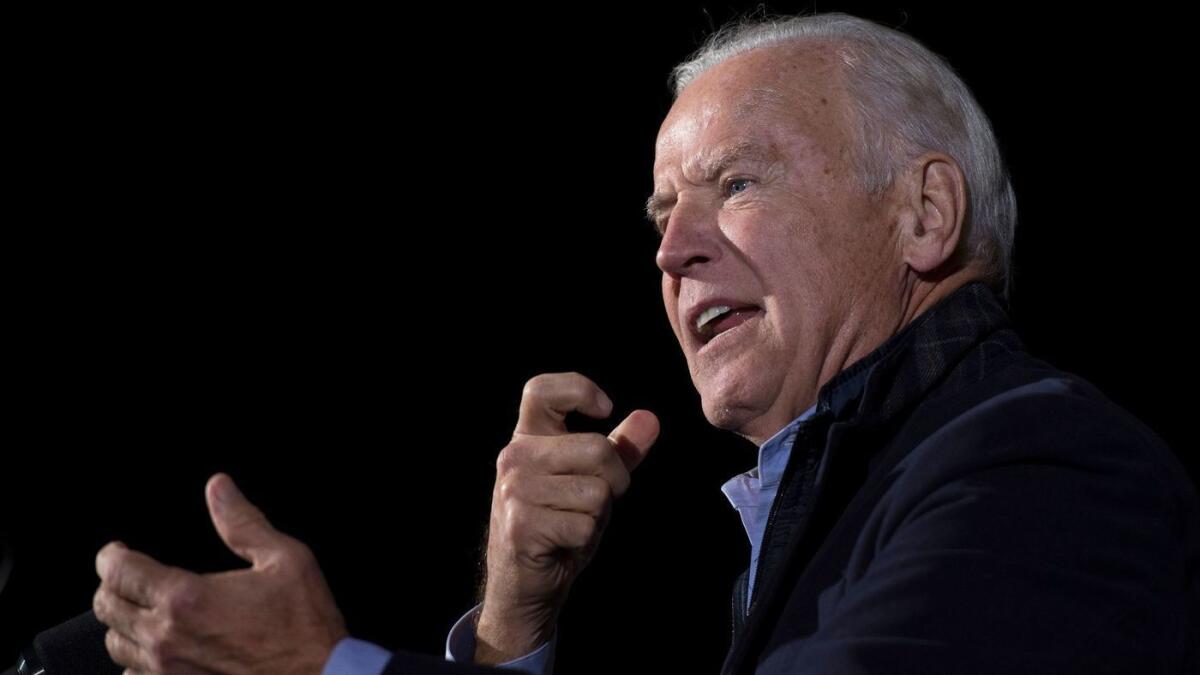
Earlier this week, Joe Biden told an audience at the University of Montana that he was “the most qualified person in the country to be president.” He wasn’t officially announcing his run — he’d decide over the holidays, he said — but one doesn’t generally say such things unless they’re running.
Plus, Biden’s never played coy about his desire to hold the office. He first ran for president in 1988. (Dropped out because of plagiarism scandals.) He ran again in 2008. (Received less than 1% of the vote in the Iowa Caucus.)
In October, Biden received some buzz as early polling showed him leading the Democratic field in 2020. These two-years-out polls don’t mean much; similar ones showed Presidents Clinton and Obama losing re-election. Two years is plenty of time for Biden, a self-declared “gaffe machine,” to give the race away.
His declaration is annoying on a couple levels. For one, Hillary Clinton is probably the most qualified person in the country to be president. (He admitted as much in 2008, before he went on to be a perfectly serviceable Vice President and she went on to be a legendary Secretary of State.) Regardless, neither should run in 2020.
And, as with Nancy Pelosi and Dianne Feinstein, Biden’s argument for office is that he is the holder of the knowledge. This is a problem, not a point of pride. Don’t get me wrong; Biden, who first entered public life as a senator in 1973, gets government inside and out. But that experience is meant to be shared, not hoarded. The aging leaders of the Democratic Party have not publicly supported successors or trained younger members to assume their responsibilities.
They’re happy to stack the ranks with clones, but can’t abide challengers. Biden hit the road at election time, campaigning for more than a dozen Democrats in the midterms and endorsing 48 candidates. The list largely looked like him: centrist Democrats and seasoned incumbents. (It also gave him an excuse to get on stage in a bunch of states while “not running” for president.)
But the midterm election, which ushered in the most diverse freshman class of Congresspeople in history, showed that Americans are ready to hear new voices and to support representatives who have not always been welcomed in the halls of power—including people of color, progressives, and/or LGBT folks.
Biden’s approach doesn’t reflect this reality. He’s absurd in the #MeToo era, having botched the Anita Hill hearings and his apology both. He’s swaddled in corporate contributions and has taken hundreds of thousands of dollars from financial service companies (which Hillary Clinton got tons of heat for when she did it). And while Trump supporters don’t seem to care if their president says whatever racist or infantile thing flies through his head, Democratic voters are unlikely to smile benevolently on Biden’s boneheaded statements this time around. Republican media outlets will exploit his every misstep. (Remember what Hillary Clinton’s off-hand “deplorables” comment cost.)
What of his ideas? In May, Biden released a broad five-point plan to shore up the American middle class. Rewrite the tax code; make public and community colleges free; remove non-compete clauses; rebuild infrastructure; and incentivize corporations to set up in more states. These are standard ideas that have been championed by myriad other politicians. Biden has also supported legislation over the years that is out of step with the current thinking on the Democratic side; for instance, the 1994 crime bill, which is criticized as being overly punitive and disproportionately impacting communities of color. While Hillary Clinton got slammed for having been first lady when it was passed, Biden wrote it.
In 2016, Trump became the oldest president ever sworn into office. He was 70. If Joe Biden were to win, he’d be 78 at his inauguration. Accepting a four-year-term at 78 is not awesome. Saying, “Man, I’ve had quite a career, let me pay it forward by shoring up some of these less-experienced talents as I retire” is awesome. The Dem brass would literally rather die in office than distribute control. They’ve made themselves singular and, in so doing, weakened the bench, making it less likely that the gains they might make would be retained. The choice to cling to power should seriously challenge, rather than cement, their legacies.
As the wise Ariana Grande would say, “Thank U, next.”
Melissa Batchelor Warnke is a contributing writer to Opinion. Follow her on Twitter @velvetmelvis.
- Share via
Subpoenas are flying over Trump’s hotel dealings. Get ready for a tweet storm from you-know-who
Get ready for a tweet storm from you-know-who.
The attorneys general for Maryland and the District of Columbia, who are suing President Trump over allegations that he is violating the emolument clause of the Constitution, banning payments from foreign governments, has subpoenaed a range of records from the president’s businesses, some of his competitors, and federal agencies that have dealt with the Trump Organization.
This could get interesting.
The Washington Post reports that the subpoenas center around Trump International, the hotel Trump’s family business owns just down the street from the White House in space leased from the U.S. government. Which means the president is his own landlord, and his hotel is frequented by foreign diplomats and other dignitaries. In fact, the inflow of business tied to the presidency – particularly Saudi rentals in Trump’s New York property – helped make the hotel profitable last year.
The Times editorial board warned even before Trump was sworn in that his business dealings, even after resigning control of the family empire, put him in a unique position in presidential politics. The only way to avoid conflicts of interest would have been to dissolve the Trump Organization and place the assets into a true blind trust in which Trump would now know where his personal interest might fall.
Now he can see those personal interests every time he looks up Pennsylvania Avenue, or travels to one of his golf courses where the government pays to house his staff and security detail, adding to the business’ bottom line.
But Trump has also steadfastly refused to reveal the full extent of his property and wealth — he is the first president in the modern era to refuse to release his tax returns.
The lawsuit by Maryland and the District of Columbia might help shed some light on that, as can other legal challenges to the president’s businesses.
It’s also worth noting that the president said last year that special counsel Robert S. Mueller III would cross a line if he were to investigate Trump’s family finances beyond the Russian influence-peddling probe. The moves involving former Trump lawyer Michael D. Cohen suggest that Mueller’s team strayed in that direction anyway.
But these subpoenas could also get at some of the same information. Stay tuned.
- Share via
George H.W. Bush was everything Trump isn’t

The death of former President George H.W. Bush is inspiring comparisons between his presidency and that of the current occupant of the White House. That was inevitable, because the traits that defined Bush’s one term in office are scandalously absent from the way Donald Trump has approached the highest office in the land.
Bush assumed the presidency after serving as a member of Congress, as ambassador to the United Nations, as CIA director and as vice president; Trump was a political amateur when he was elected (and proud of it). Bush was respectful of the expertise of his advisers and career government officials; Trump disdains them as a sinister “Deep State.” Bush was willing to abandon his “Read my lips: No new taxes” campaign pledge in order to cement a compromise agreement on the budget; Trump is loath to repudiate positions he took on the campaign trail, such as his reckless promise to withdraw from the Iran nuclear agreement.
Bush was an ambitious politician, but he also was self-effacing and reluctant to personalize the achievements of his administration. For Trump, everything is about Trump. And Bush cherished civility, despite some low shots on the campaign trail — especially his campaign’s questionable use of a prison furlough program against his opponent, Michael Dukakis. (Willie Horton, a black man who raped a woman after escaping while on furlough, figured in a racially inflammatory TV aid aired by Bush supporters.)
A handwritten note Bush left for Bill Clinton, the Democrat who defeated him in 1992, is being widely circulated this weekend, and for good reason. In it, Bush advised Clinton not to allow critics to “discourage you or push you off course.” Bush closed the letter by telling his successor: “Your success now is our country’s success. I am rooting hard for you.” Contrast that encouragement with Trump’s obsessive attacks on former President Barack Obama. Contrast it with the crowds at Trump’s campaign rallies, egged on as they shout enthusiastically for the incarceration of Hillary Clinton.
But instructive as these comparisons are, it diminishes the contributions of Bush to regard him simply as an anti-Trump. His presidency lasted only four years but registered significant accomplishments in both foreign and domestic affairs.
Bush and his secretary of state, James A. Baker III, engaged in deft diplomacy after the fall of the Berlin Wall to help bring about the reunification of Germany (though some scholars fault the administration for encouraging Russian leaders to believe that NATO wouldn’t extend eastward, as it ultimately did).
Bush rallied an international coalition after Iraq invaded and occupied Kuwait in 1990, but he deliberately stopped short of overthrowing Saddam Hussein. Later, he explained that occupying Iraq “would shatter our coalition, turning the whole Arab world against us, and make a broken tyrant into a latter-day Arab hero.” The bloody aftermath of the second Gulf War prosecuted by Bush’s son and successor George W. Bush vindicated the first President Bush’s caution.
Domestically, Bush will be remembered for signing the Americans With Disabilities Act, which expanded civil rights law to require positive accommodations in the workplace for people with disabilities, and the Clean Air Act of 1990 which sought to protect the ozone layer. Bush also established a Global Change Research Program, which was followed by congressional legislation to mandate reporting on climate change. (This marks another contrast with Trump, who said of his own administration’s report on the threat posed by climate change: “I don’t see it.”)
Bush appointed two justices to the Supreme Court: David Souter, who disappointed many conservatives with his generally liberal rulings, and Clarence Thomas, who has anchored the extreme right of the court since his appointment in 1991. The nomination of an ideologue such as Thomas was a departure from Bush’s usual moderate conservatism.
Consequential as many of his administration’s policies were, Bush is being remembered more for his restrained demeanor, his self-effacement and his view that serving in government could be an act of patriotism. That’s not surprising given the bitterly divided state of American politics today, when concepts like bipartisanship and cooperation and shared values and civility seem almost quaint and anachronistic.
On Saturday, Chief Justice John G. Roberts Jr.said of Bush that he was “ an extraordinary American patriot and fundamentally decent man.”
That would have been an apt encomium regardless of who the current president happened to be; but Trump’s contempt for the values Bush held dear lends it a special poignance.
- Share via
More than a year after Harvey Weinstein, #MeToo is still toppling powerful men
More than a year after reports about movie producer Harvey Weinstein kicked off a cultural movement, #MeToo hasn’t seemed to have lost its potency. At least not in California, where two powerful men accused of misconduct saw their political careers derailed this month.
California Democratic Party Chairman Eric Bauman resigned Thursday after a Los Angeles Times investigation uncovered several allegations that he had made sexually explicit comments to staffers and engaged in unwanted touching. Within hours of the Times story’s publication, Gov.-elect Gavin Newsom and other Democratic Party leaders were calling for him to step down.
State Sen. Joel Anderson (R-Alpine) had his own #MeToo moment this summer, and it may have cost him a seat on the state Board of Equalization. The termed-out legislator had a huge lead over his Democratic opponent coming out of the June primary. But in September, Anderson was reprimanded by his colleagues for an incident in which he allegedly threatened to “bitch slap” a female lobbyist.
And on Nov. 6, he lost his bid for the 4th District BOE seat that had been held by Republicans for four decades, defeated by little-known Democrat Mike Schaefer. Was that an effect of the blue wave or #MeToo? I’d guess a little of both.
Are these two examples evidence that we’ve moved past a hashtag movement and are seeing the effects of a true cultural shift? I don’t know. But if misconduct allegations are still enough to topple powerful people a year from now, then it may be time to happily retire the #MeToo modifier.
- Share via
Matthew Whitaker has sleazy business connections? He’ll fit right in with the Trump administration
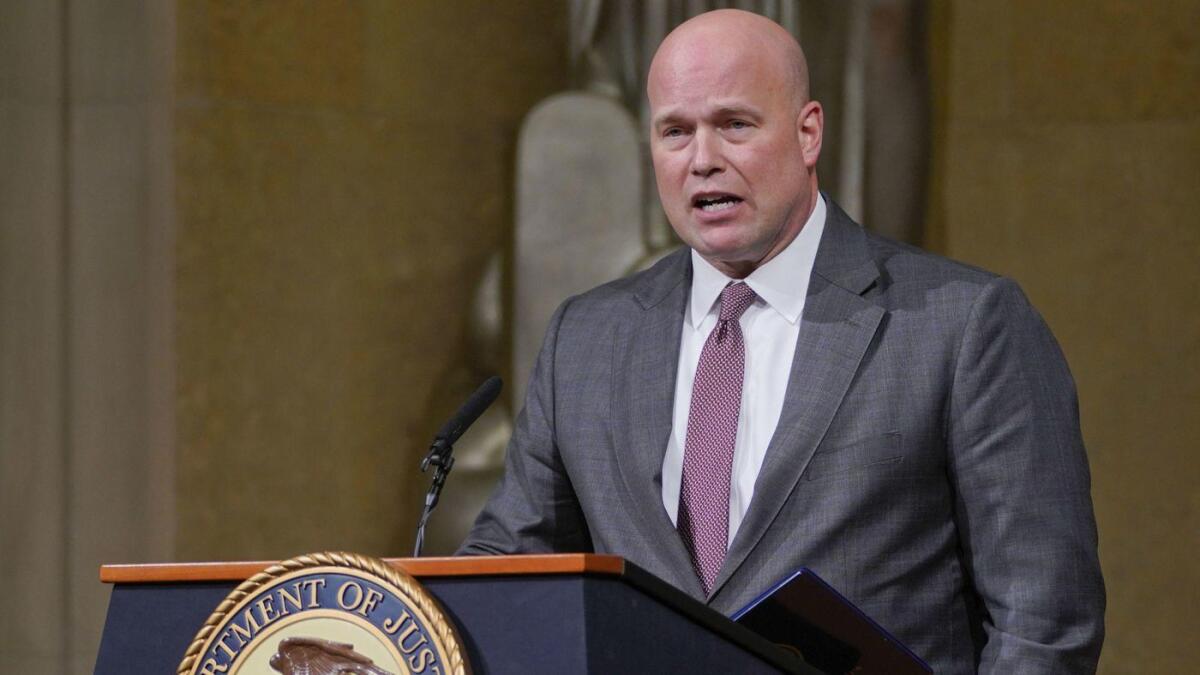
At first I didn’t believe Matthew Whitaker was qualified to serve as President Trump’s acting attorney general, but I’ve come around after reading about his involvement with World Patent Marketing before it went out of business.
He is indeed sleazy enough to fit right in with the this administration’s band of miscreants.
The Federal Trade Commission earlier this year won a court order shutting down World Patent Marketing, which targeted small-time inventors. The firm also agreed to pay $26 million in fines without admitting any wrongdoing (a longstanding but perturbing practice — the government ought not let such firms off without admitting guilt).
Whitaker, then a former U.S. attorney, joined the Florida-based World Patent Marketing in 2014, and his experience was touted to enhance the firm’s reputation. Whitaker appeared in promotional materials while he was fielding complaints from consumers enraged by what one described as a “fraudulent” company.
Records released by the FTC also included a typo-filled email to Whitaker from someone self-described as a “former United States attorney for the southern district of Brooklyn New York” angry over receiving emails that were full of baloney (although the writer used a more evocative term). “You are party too a scam that is driving allot of traffic to WPM site .. You will be exposed ... I hope I make myself clear Mr. Whitaker.”
So Whitaker can’t say he wasn’t warned. In fact, in one response, Whitaker threatened a complainant.“Your emails and message from today seem to be an apparent attempt at possible blackmail or extortion,” Whitaker wrote to someone whose name was redacted in the released record. “You also mentioned filing a complaint with the Better Business Bureau and to smear World Patent Marketing’s reputation online. I am assuming you understand that there could be serious civil and criminal consequences for you if that is in fact what you and your ‘group’ are doing.”
Whitaker also didn’t comply with an FTC subpoena for records related to the business, even after he moved to Washington to become then-Atty. Gen. Jeff Sessions’ chief of staff — an appointment that surprised the lead FTC official pursuing the case against World Patent Marketing.
“You’re not going to believe this,” James Evans of the FTC’s Bureau of Consumer Protection emailed three colleagues on October 2017. “Matt Whitaker is now chief of staff to the Attorney General. Of the United States.”
And now he’s the acting attorney general.
Rep. Elijah Cummings and other Democrats on the House Oversight Committee have already zeroed in on Whitaker and have sought records on his involvement with the marketing firm.
So the cynical question is whether Whitaker gets driven out of the job before he can find a pretext for firing Special Counsel Robert S. Mueller III.
- Share via
Trump is going after preexisting condition protections like he didn’t just get whooped in the midterms

It’s almost as if the midterm election escaped the notice of the U.S. Department of Health and Human Services.
As you may recall, voters decisively bounced Republicans from control of the House. Democrats had spotlighted Republicans’ attacks on Obamacare, and more specifically the GOP’s efforts to end the law’s protections for millions of people with preexisting conditions. (Those protections apply to the roughly 15 million people who buy insurance directly because they’re not covered by health plans at work; a different federal law provides similar protection to people covered by large group plans.)
Yet here we are, a little more than three weeks from the election, with a new gambit by HHS to promote cheaper, thinner insurance policies — at the expense of people who need comprehensive coverage. You know, like people with preexisting conditions.
The document issued Thursday by HHS’ Centers for Medicare and Medicaid Services offers four alternative approaches to Obamacare that states might take under a rule CMS issued last month. One would allow states to design their own plans for distributing federal premium subsidies for low- and moderate-income households, rather than following the income limits and subsidy percentages set by Congress. A second would direct such subsidies into health savings accounts, encouraging consumers to sign up for high-deductible policies. A third would allow states to provide subsidies to health plans that don’t comply with Obamacare’s requirements, including the one requiring policies to offer comprehensive coverage. A fourth would let states shunt people with high healthcare costs (read: preexisting conditions) into the sort of high-risk pools that many states used prior to Obamacare.
“Nothing in the new guidance or the waiver concepts changes the requirements for health insurance issuers to provide protections for people with preexisting conditions,” the administration stated in Thursday’s release. And that’s true to a point — insurers would still be required to offer coverage to people regardless of their health histories, and not to factor a person’s preexisting conditions into his or her premiums.
But a key piece of the Obamacare approach was to gather everyone in the individual market into big regional pools and comprehensive health plans so that risks and costs could be spread broadly. To varying degrees, each of these approaches the administration touted Thursday could be used to split those pools into more and less risky groups, encouraging younger, healthier people to abandon comprehensive coverage and concentrating more of the cost of those plans onto the people who need them.
That’s a feature of the administration’s approach, not a bug. Granted, Obamacare’s insurance reforms are hardly the only way to ensure that people with preexisting conditions have access to the coverage they need at rates they can afford. (And it wasn’t especially good on the affordability front.) But we’ve already seen what happens when states create high-risk pools: The cost of the premium subsidies eventually grows so large, states limit enrollment and roll back coverage, exposing a growing number of people to the risk of ruinous medical bills.
Innovative state approaches to curbing healthcare costs and making comprehensive insurance more affordable would be welcome. The administration’s proposal, however, seems geared more toward providing thinner, cheaper plans to people who least need coverage.
- Share via
Dear Paul Ryan, California’s voting system is only ‘bizarre’ if you don’t want people to vote
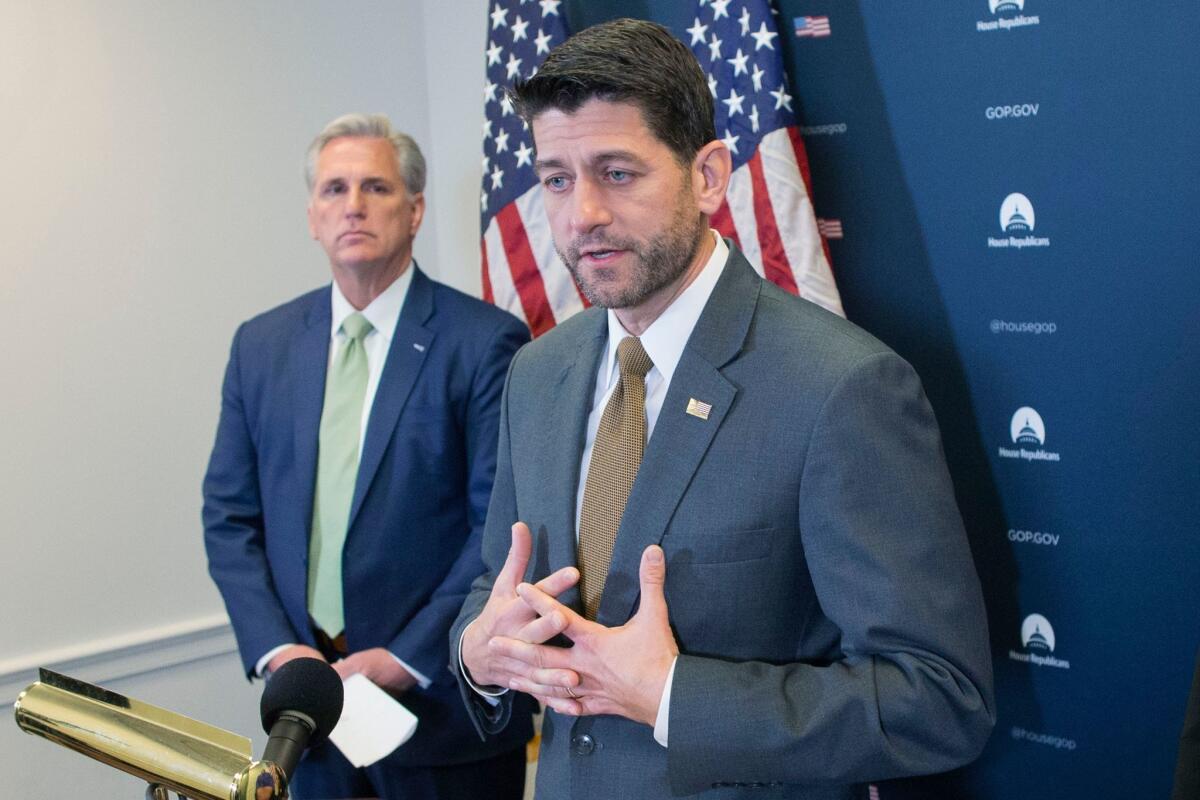
On Thursday, soon-to-be-ex House Speaker Paul Ryan (R-Wis.) called the Golden State’s voting system “bizarre” and suggested there was something hinky about how long it took to know the outcome in certain races.
“When you have candidates who win the absentee ballot vote and then lose three weeks later because of provisionals, that’s really bizarre,” Ryan said. “I just think that’s a very, very strange outcome.”
Certainly Ryan and his caucus are dismayed about the outcome in the midterm elections, losing half of the already small number of GOP House seats in California, not to mention control of the House altogether. But if he’s bewildered by California’s voting system, perhaps it is because he’s not used to states that are making it easier for people to vote.
As we have pointed out, California has enacted all sorts of measures in recent years to ensure than any qualified adult can vote if he or she wants to, from enabling people to register on election day to allowing mail ballots to be counted even if they arrive three days after the polls close. All these efforts have resulted in record registration and in record turnout.
As for why Ryan’s party lost so badly in California? That was bound to happen — the state has become more liberal, and the independent redistricting panel means that no one party can manipulate the political lines to their advantage.
If that’s bizarre, it doesn’t say much about what goes on in other states on election day.
- Share via
Twitter is in trouble if it doesn’t do a better job explaining why it bans conservatives like Jesse Kelly

Two days after Twitter reportedly slapped a permanent ban on right-wing radio host Jesse Kelly without warning or clear explanation, it restored his ability to tweet a mix of goofy humor, insults (directed mainly at Democrats) and provocations about race, gender and whatever else was on his mind to his 111,000 followers.
No big deal, right? Considering the sort of things Kelly says, he was bound to get grounded by the Twitter enforcement team sooner or later. (This is the sort of thing Kelly says: During his last appearance on Fox News Channel, he described soon-to-be House Speaker Nancy Pelosi by saying, “She has the likability of chicken pox. ... She comes off as somebody who’s cooking a stew with small children inside.” Even the Fox host seemed appalled, saying, “Next time we’ll try to elevate the level of the conversation here.”)
But for the folks on the right side of the partisan divide, Kelly’s suspension was just the latest example of a dominant social media outlet trying to silence conservatives. A newly elected Republican senator called for a congressional investigation into Twitter’s alleged political bias. Even some of Kelly’s critics cried foul:
Twitter’s official response is that Kelly’s account “was temporarily suspended for violating the Twitter Rules and has been reinstated.” The company also stated, “The Twitter Rules are enforced judiciously and dispassionately, and not based on ideology.”
If this is the best Twitter can do, it’s headed for trouble.
Big companies have to play by different rules than small companies. If Twitter were one of many competing outlets helping users broadcast blurb-sized nuggets of wisdom or idiocy to the public, then it could run its shop as opaquely as it pleased. Private companies, after all, are not bound by the 1st Amendment — they can enforce whatever rules on users’ utterances that they like, as arbitrarily as they please.
But as soon as a company becomes as dominant in its market as Twitter is, deep state operatives embroider a target on its back.
OK, it doesn’t actually happen that way.
But lawmakers and regulators do feel considerably more pressure (and temptation) to use the power of government to rein in perceived abuses by the company. And make no mistake, Republicans perceive plenty of abusing going on, in part because Twitter often won’t reveal exactly what the problem was that prompted the enforcement action.
Beyond that, there’s the subjective nature of “offensive” or “hateful” content. What strikes one person as edgy may very well come across as insensitive or worse to another. It’s hard to turn the process of evaluating comments about politics, culture, values and other loaded subjects into something that’s purely objective and dispassionate.
Kelly lately has waded into two issues that seem far more sensitive to folks on the left than to folks on the right: the Confederacy and transgender people. He and his supporters insisted that Kelly was careful not to cross any lines with his tweets, which means he’s being punished not for what he said, but what he thinks. As long as Twitter leaves the public guessing about what prompted Kelly’s suspension (Kelly shared the note he received from Twitter on Sunday night, which said his account “was permanently suspended for multiple or repeat violations of the Twitter Rules,” which clarifies exactly nothing), people will fill in the blank with whatever speculation fits their worldview.
Maybe Twitter is safer now that Democrats have won control of the House. But one can easily imagine Democrats going on the attack too as soon as a few popular left-of-center speakers find their Twitter accounts mysteriously silenced.
- Share via
Trump to GM: Drop dead
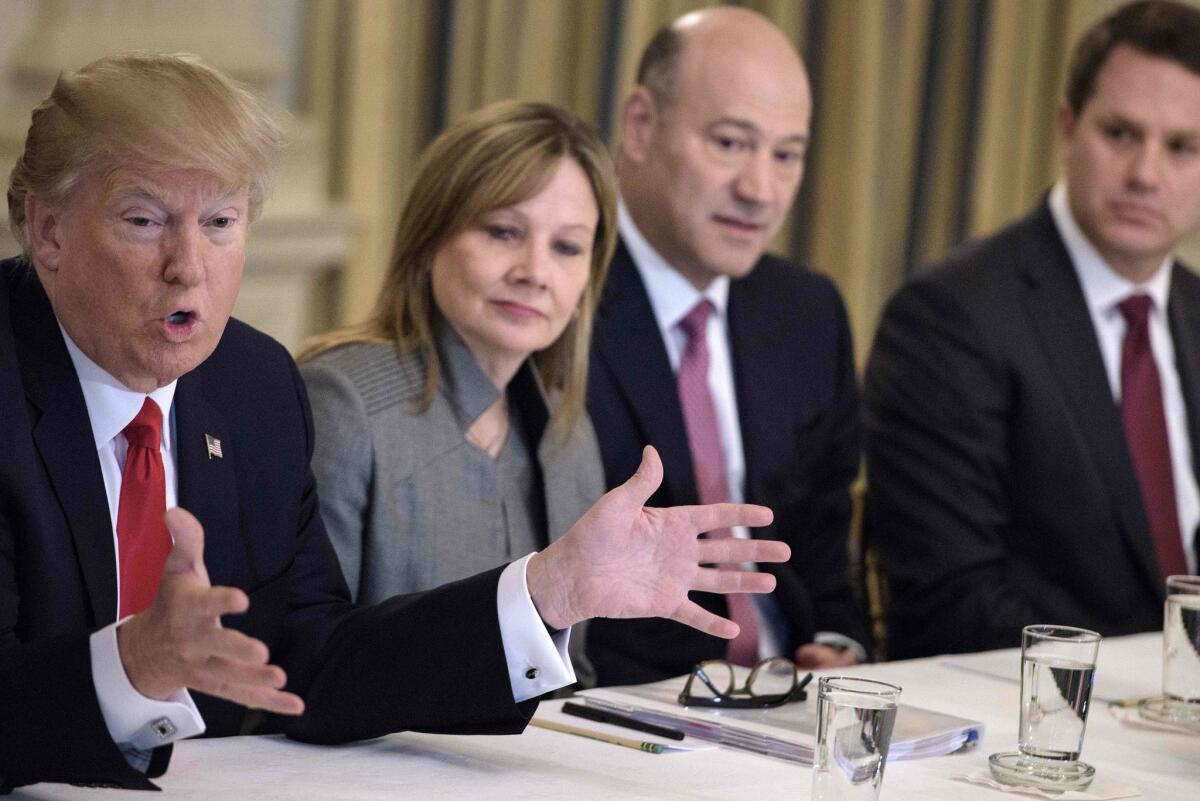
For someone who has pushed hard to free U.S. companies from federal interference, President Trump is unusually willing to tell U.S. companies how to run their businesses.
The latest example is General Motors, which announced plans Monday to cut thousands of jobs and potentially shutter a handful of factories in the face of softening car sales. Traditional Republicans might consider this sort of development a painful but necessary part of the business cycle. To Trump, though, it was a needless blow to an important constituency — autoworkers — in Ohio and Michigan, two blue-collar-heavy Midwestern states that were important parts of his winning coalition in 2016. (The company’s updated plans also envision plant shutdowns in Maryland and Canada, plus two unspecified plants outside of North America.)
So Trump hectored and threatened GM’s leadership, both directly and through the media. He raised the stakes Tuesday on Twitter:
You can insert your own thoughts here about the constitutionality of suddenly (and unilaterally) withholding subsidies from one company while providing them to its competitors. Also, note that the subsidy Trump specified is tied to one of the products GM CEO Mary Barra says is crucial to the company’s future.
Republicans may not object to Trump bullying world leaders in pursuit of this country’s priorities. But bullying the leader of a company in a globalized industry for having a global strategy? That should drive conservatives nuts.
Trump’s America First perspective seems to be making it hard for him to see the reality of GM’s situation. Like many multinational corporations, automakers have factories around the world not just to cut labor costs, but to put production closer to the demand its serving. And though sales dipped slightly in the U.S. last year, they continued growing robustly overseas, especially in China and other developing countries.
So while it might make sense to trim production in the United States, particularly of small cars that are making up a shrinking share of the local market, it makes no sense to roll back production in China — or in Mexico, a prime exporting location thanks to its many tariff-cutting trade agreements.
Whether GM’s bet in China pays off depends on a number of factors, including whether China allows GM to succeed. But Trump may be giving the company’s Chinese investments an unintended hand by piling hefty tariffs on Chinese goods imported into the U.S., which in turn have prompted China to slap tariffs on a growing number of U.S. exports. With those extra costs in place, it’s cheaper for a U.S. company to serve the Chinese market by producing goods there with non-U.S. parts than it would be to serve it with goods exported from a plant in, say, Ohio.
In fairness, Trump’s tariff policy aims to change truly bad behavior that the Chinese government has encouraged or even adopted as policy. The administration has the right goal, which is to stop the theft of intellectual property and eliminate the subsidies and trade barriers that violate international agreements. It’s just that the tactics it’s using — unilaterally imposing tariffs that raise prices for U.S. consumers and invite retaliatory tariffs that hurt U.S. exports — could cause a lot of unnecessary collateral damage.
That damage could increase if the president raises tariffs on $200 billion worth of Chinese goods on Jan. 1, as threatened, and slaps new tariffs on an additional $267 billion worth of Chinese imports. Tariffs are consumption taxes, and the larger and more unavoidable they become, the greater the downward pressure they place on the U.S. economy.
Just a reminder: U.S. automobile sales, like the overall U.S. economy, are cyclical. Industry analysts started predicting more than a year ago that sales were leveling off and would start to slide, and that’s what Barra is reacting to. In fact, the downturn in both automobile and home sales has some economists worried about a recession.
No one welcomes big layoffs — GM’s planned cuts would sacrifice about 8% of the company’s jobs. But Barra recognizes that consumers, not presidents, ultimately decide what happens to auto sales and each company’s market share. And company leaders, not presidents, have to decide how to compete and thrive over the long run.
- Share via
Skipping background checks for the people hired to care for detained migrant kids? What could go wrong?
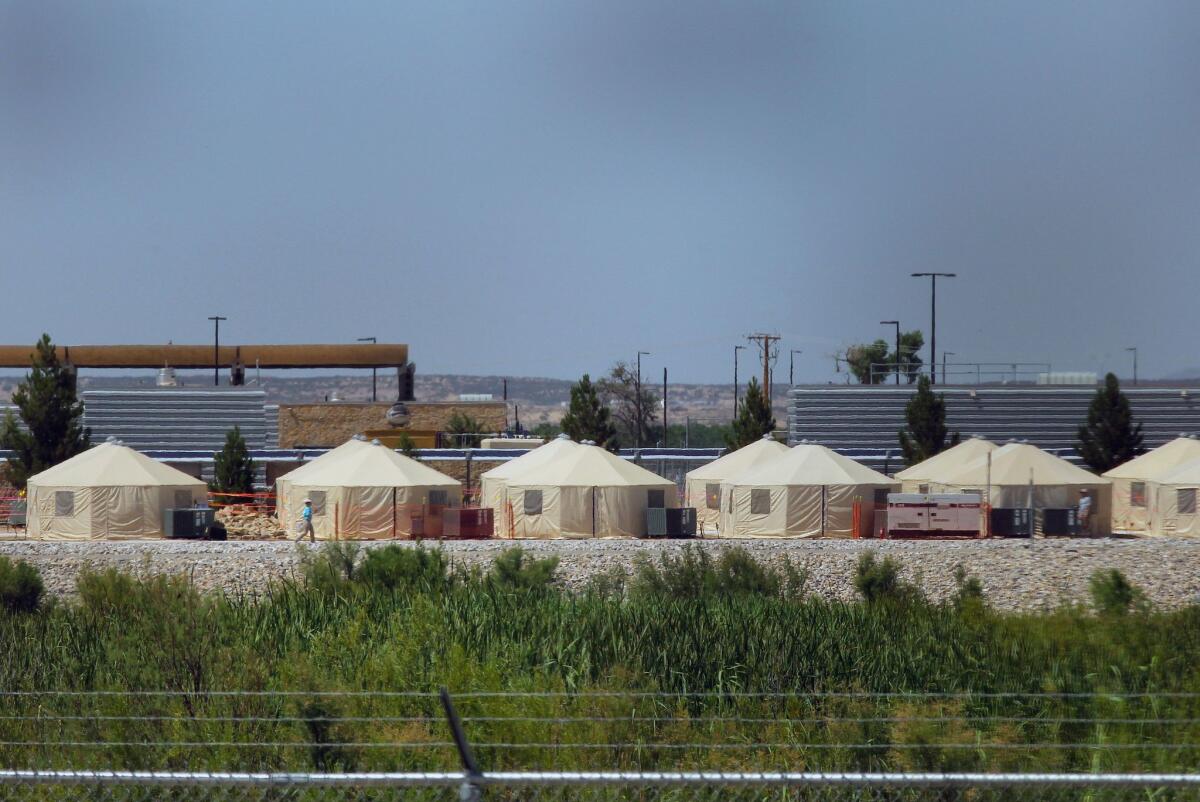
The federal government owns a detention center for children in Tornillo, Texas, an El Paso-area border village of some 1,600 people. Coincidentally, the Tornillo Influx Care Facility also houses about 1,600 minors, though there are plans to increase the capacity to 3,800 beds.
Unfortunately for the migrant children detained there, BCFS Health and Human Services, the Texas nonprofit agency the government’s Office of Refugee Resettlement hired to operate the center, failed to conduct sufficient background checks on 1,300 employees hired to care for the children, including whether staff members have a history of child abuse or neglect.
That’s absurd.
News of the failure to properly vet workers is included in a special report by the federal Health and Human Services inspector general, which also faulted the agency for hiring too few clinicians to provide mental health support for children who suffered a range of traumas before arriving at the center.
That failure to hire a sufficient number of clinicians will likely become more problematic as the center’s capacity expands, and as the average length of stay for the children has increased from 20 days to 27 days.
“It is imperative that [the refugee resettlement office] take steps to ensure that Tornillo adheres to comparable program requirements to keep [unaccompanied minors] safe and provide access to the mental health care they may need,” the report said.
Rather than submitting the new hires to FBI fingerprint checks, shelter officials used a private contractor that conducted less comprehensive background searches. The center also waived the child abuse/neglect checks, presuming that those records would turn up in the fingerprint checks — which weren’t done.
Slight good news: The report says the Office of Refugee Resettlement is working with Tornillo administrators to address the background check problem.
That leaves the paucity of clinicians. Because Tornillo is considered a facility for children who will be present only temporarily as the government finds longer-term placements for them, the policy allows for one clinician for every 100 children to attend to emergency mental health issues. By contrast, a permanent facility must have one clinician for every 12 children.
The inspector general recommended that the government staff Tornillo as it would a permanent facility. It pointed out that a similar “flux” facility in Homestead, Fla., must adhere to the smaller ratio.
Part of the problem is the government’s decision to treat Tornillo, a pop-up tent village that opened in June, as a temporary way station for children. But that doesn’t absolve the government of ensuring that it is not placing the minors at risk.
Unfortunately, the government’s failure to properly handle the migrants it insists on detaining is becoming a norm rather than an exception. And that is unacceptable.